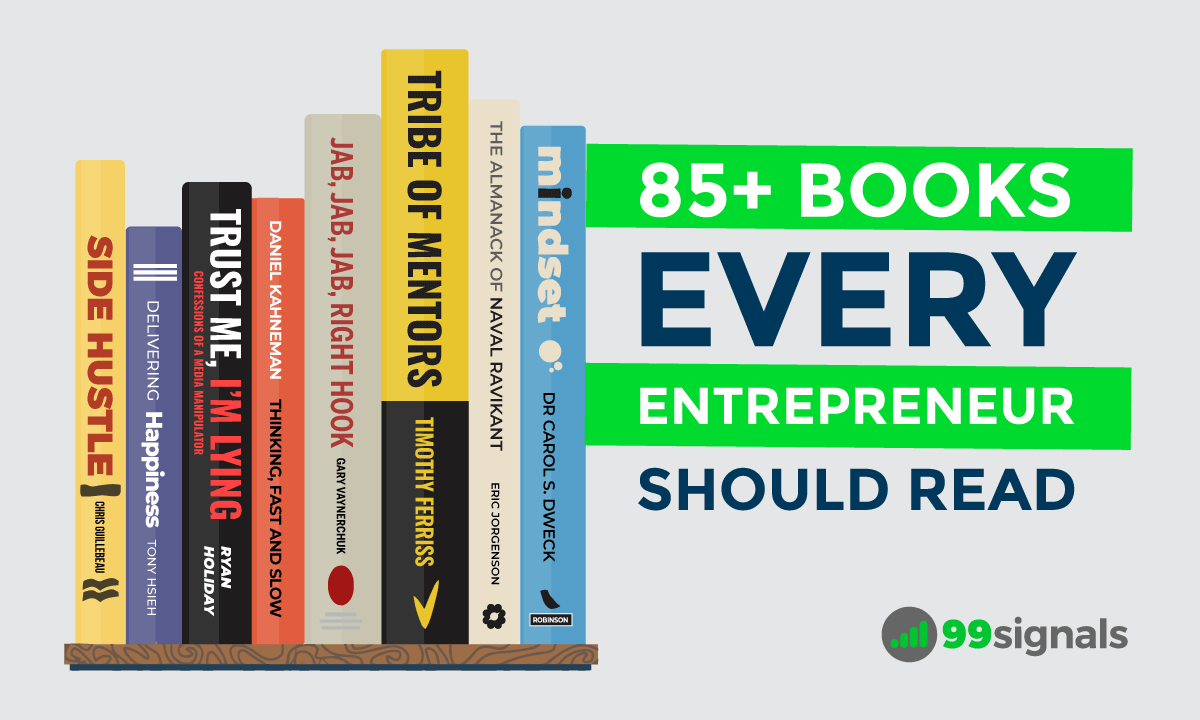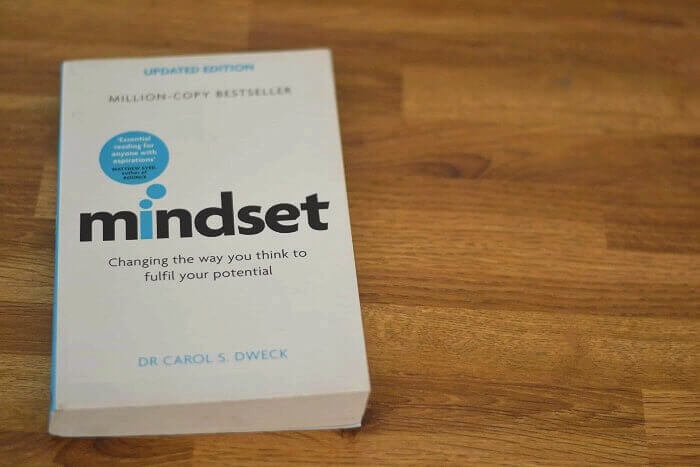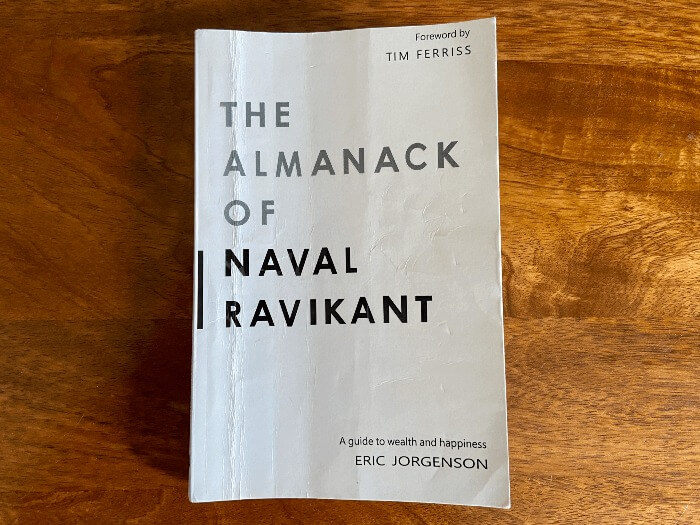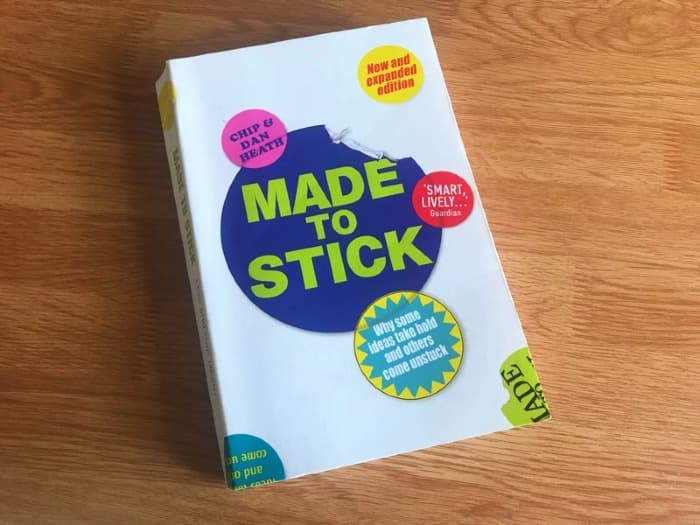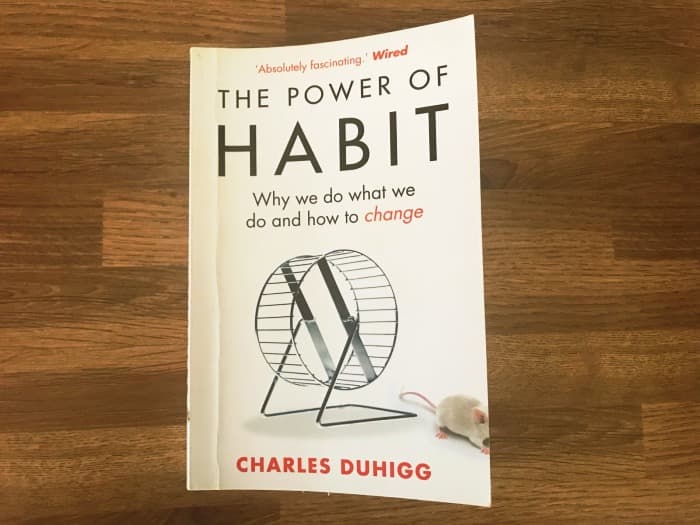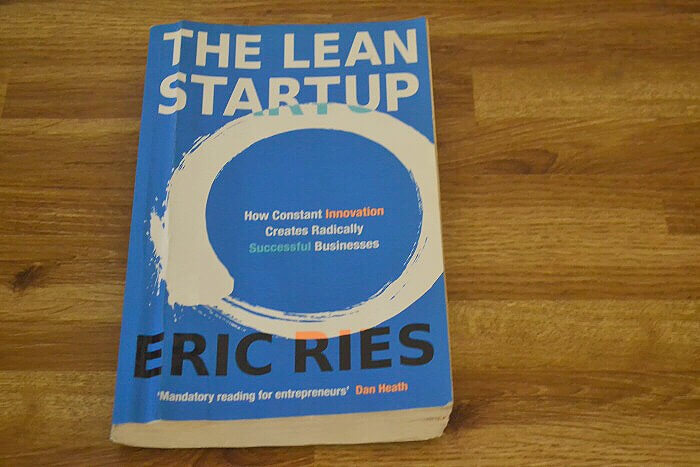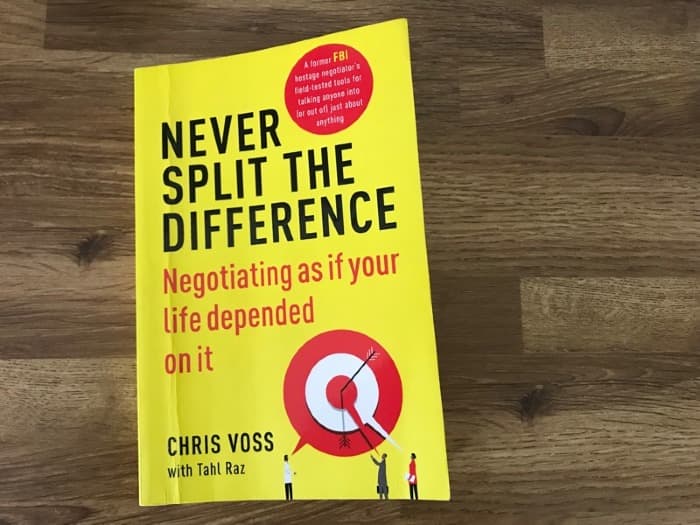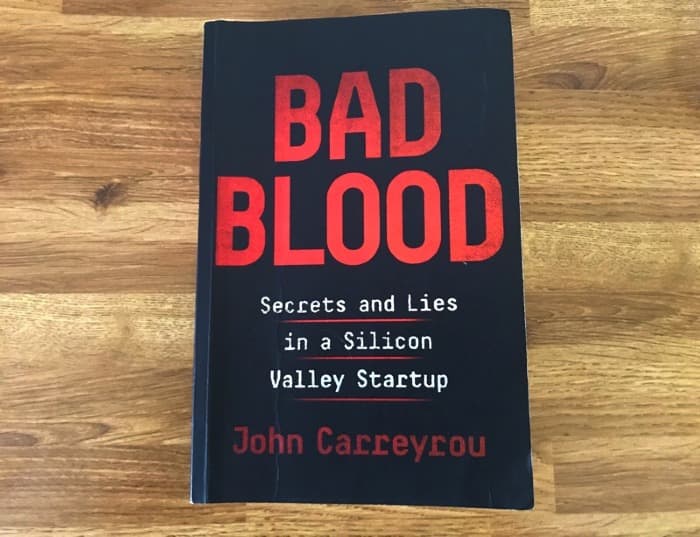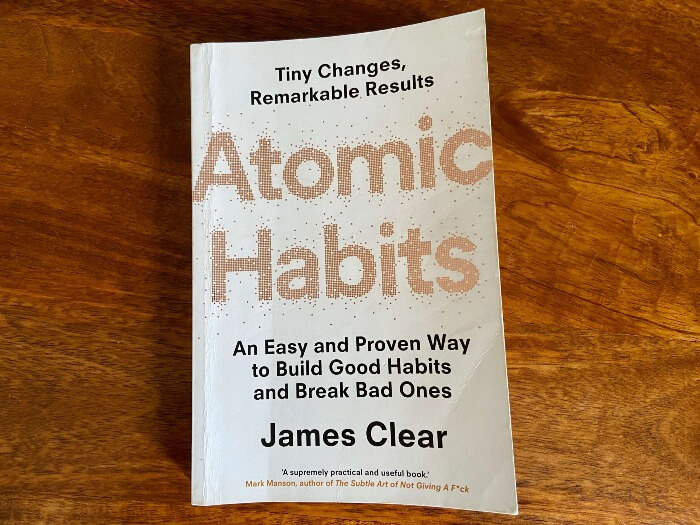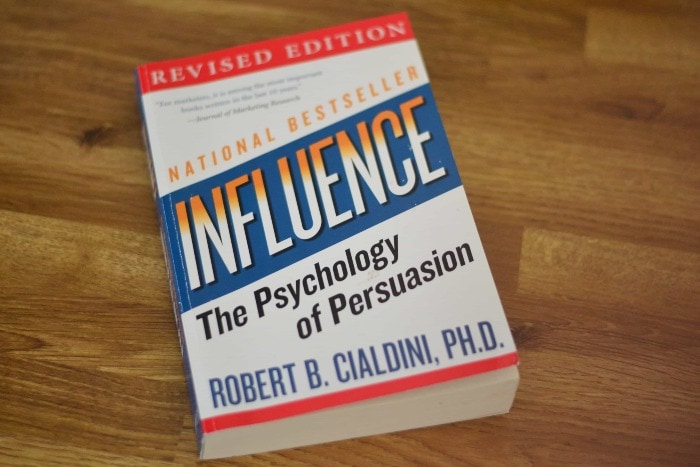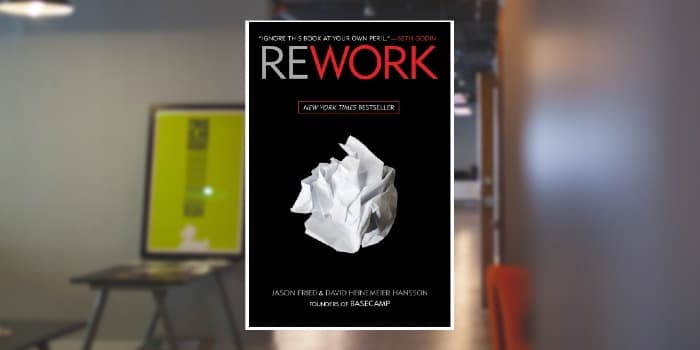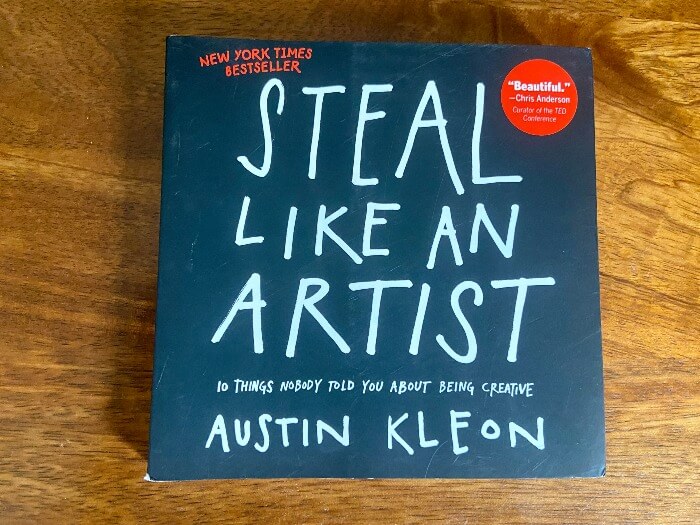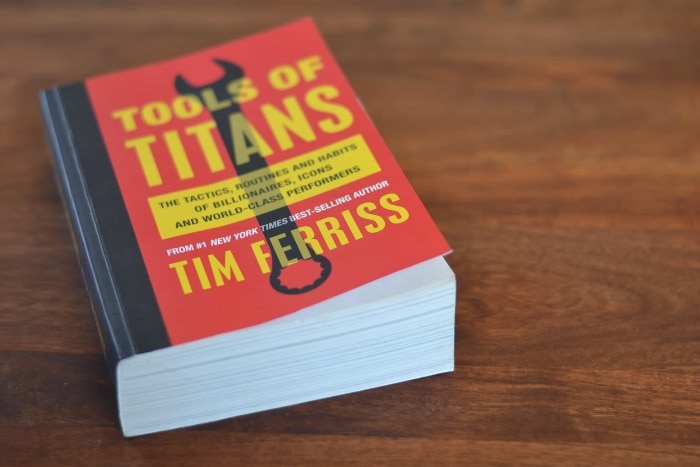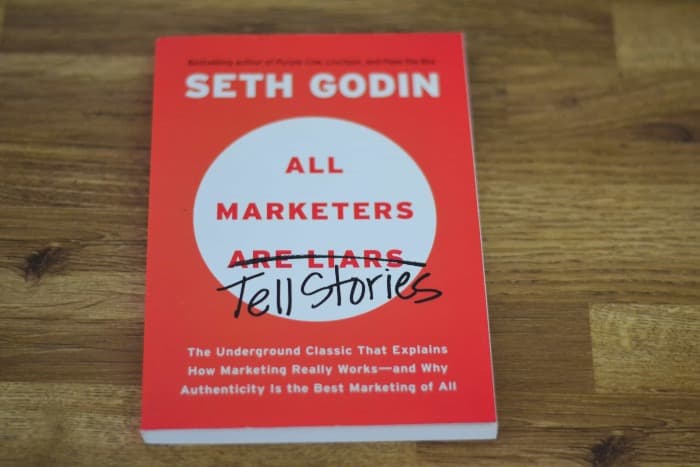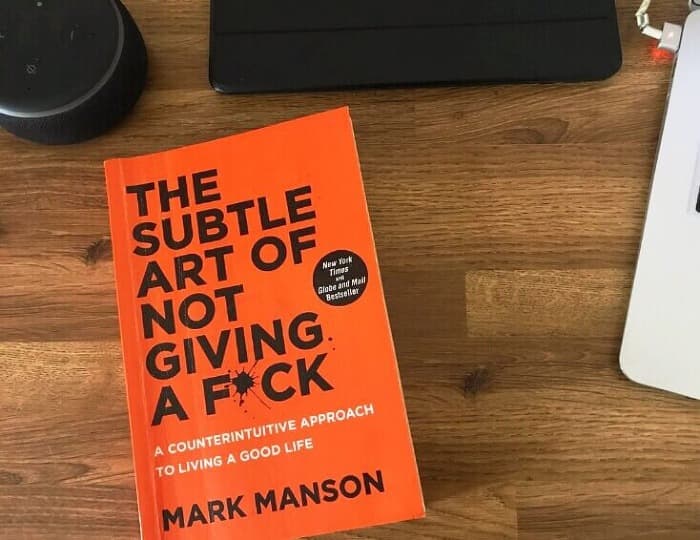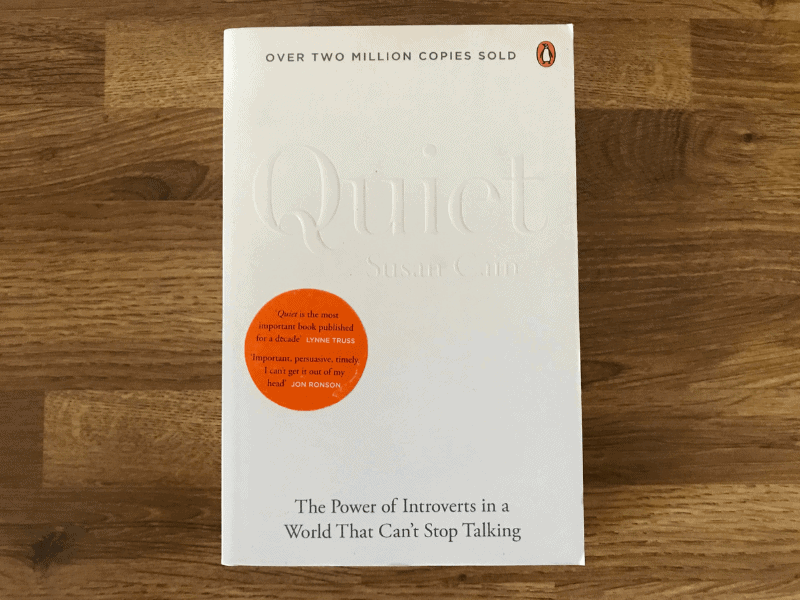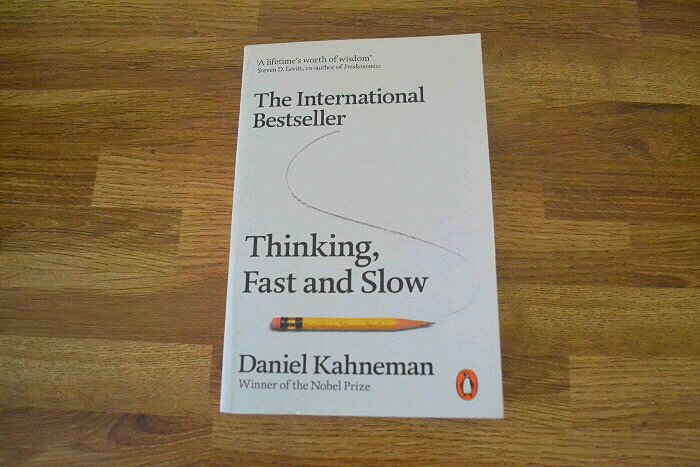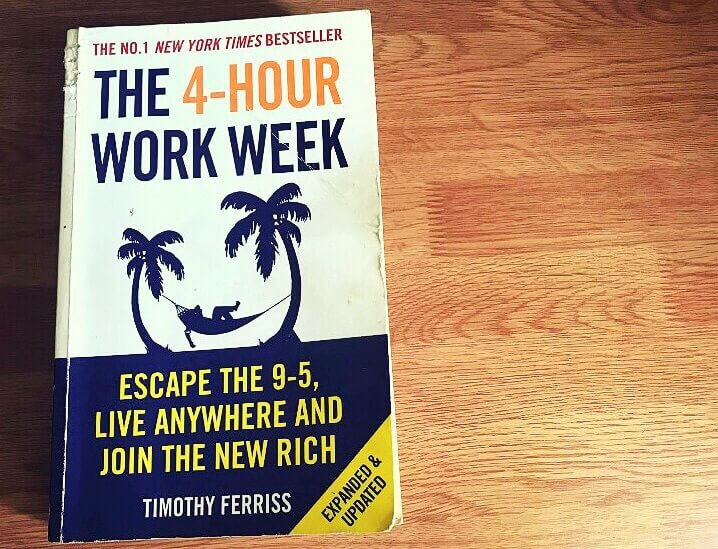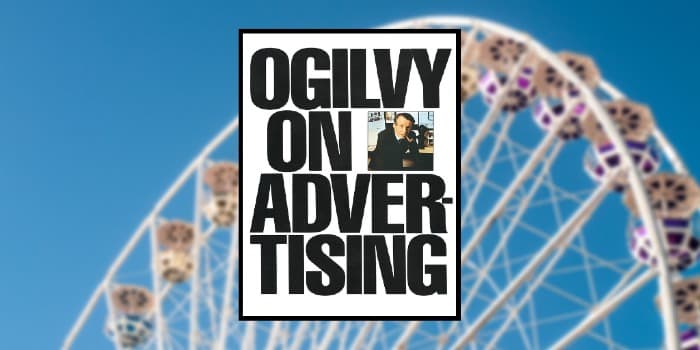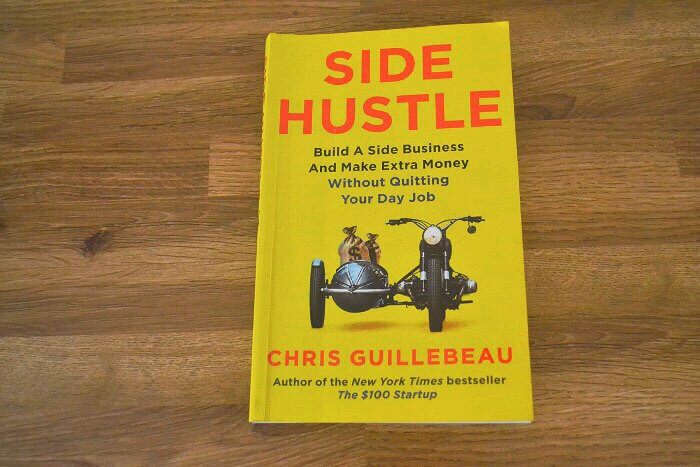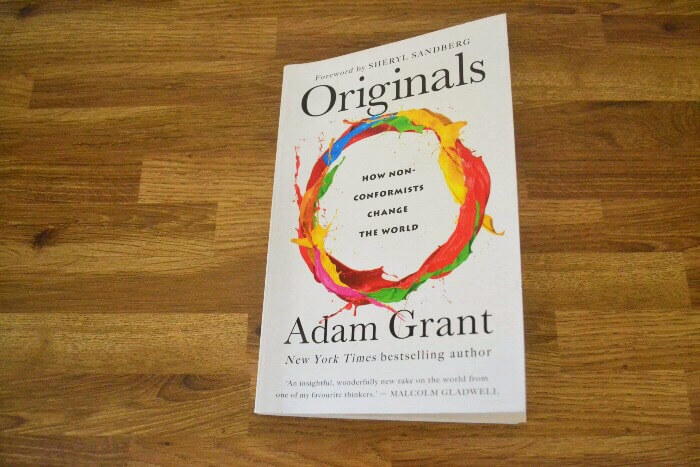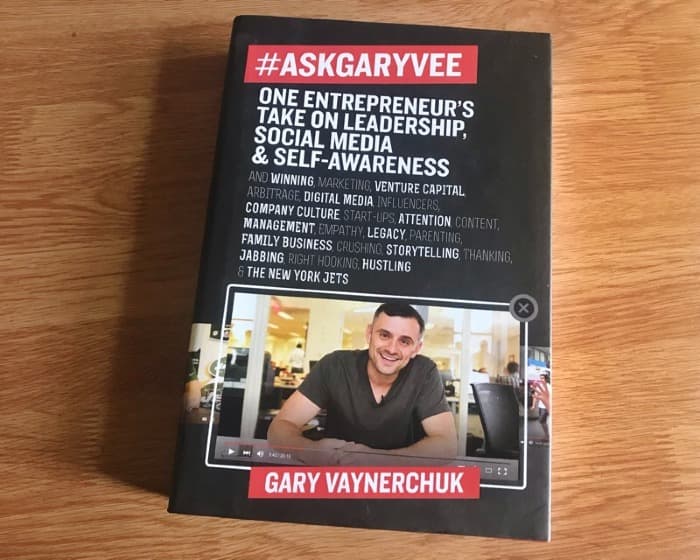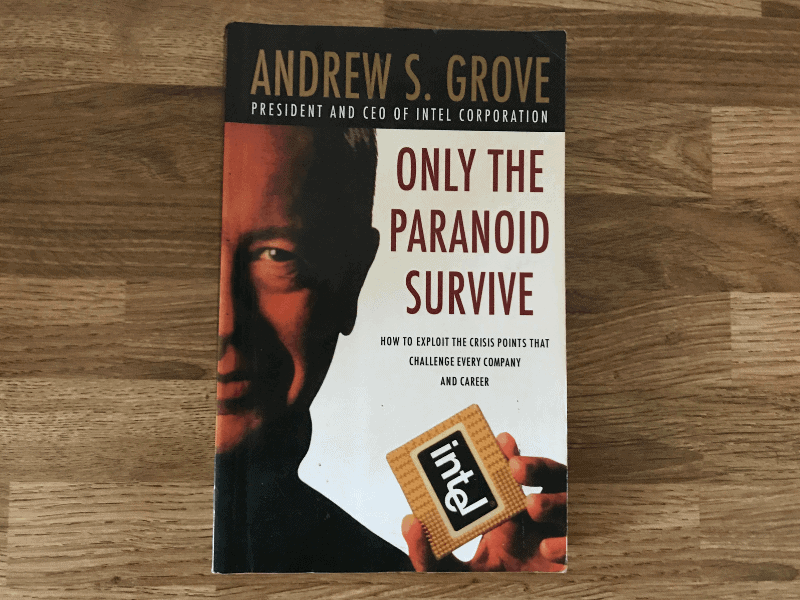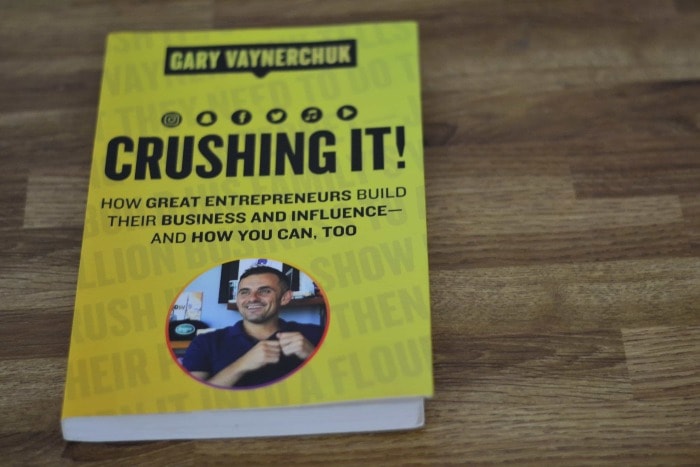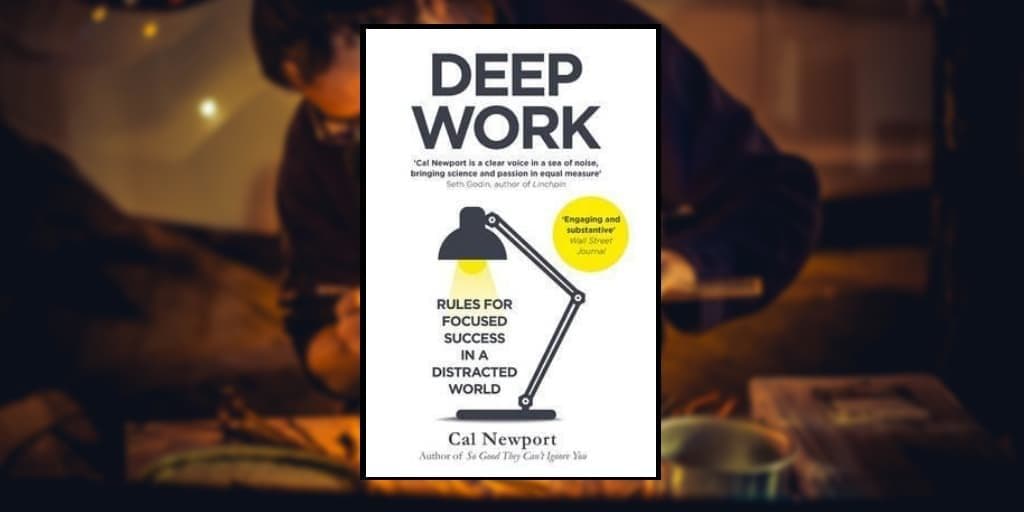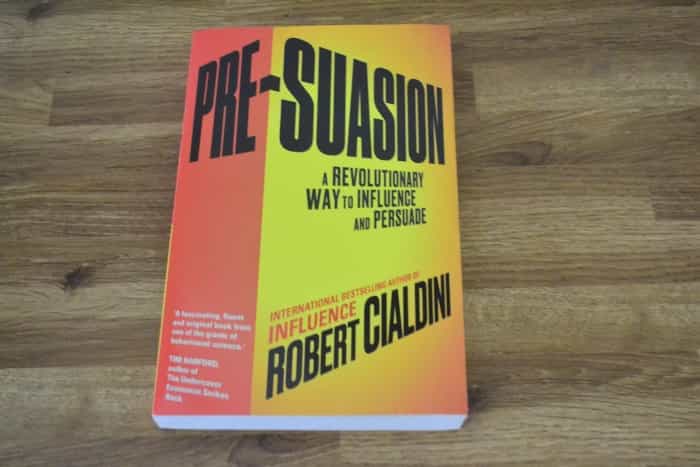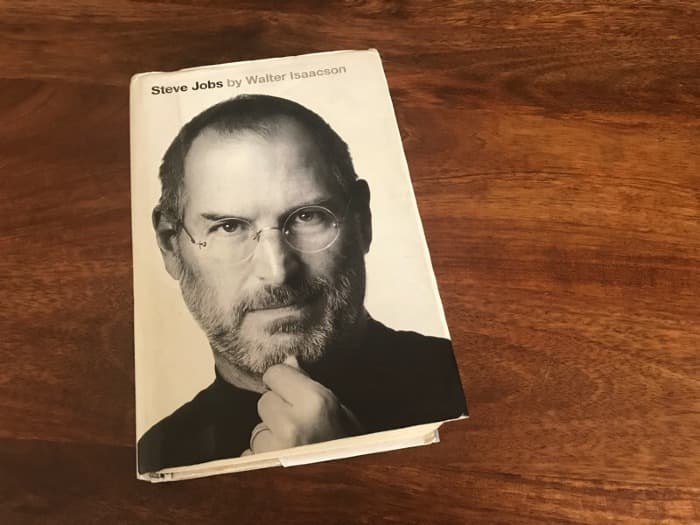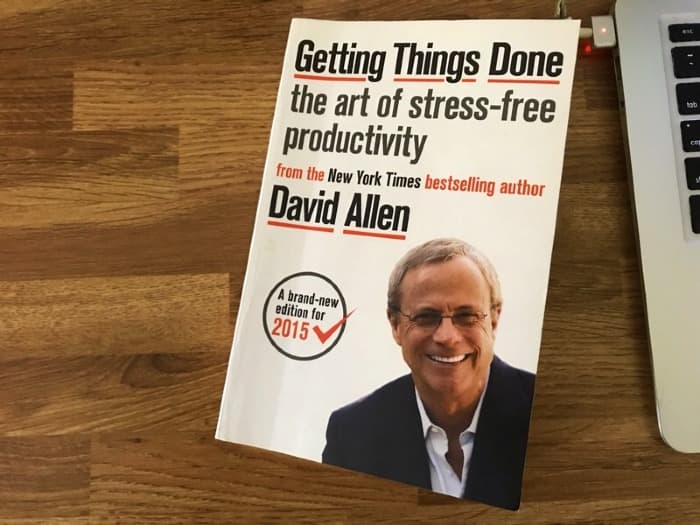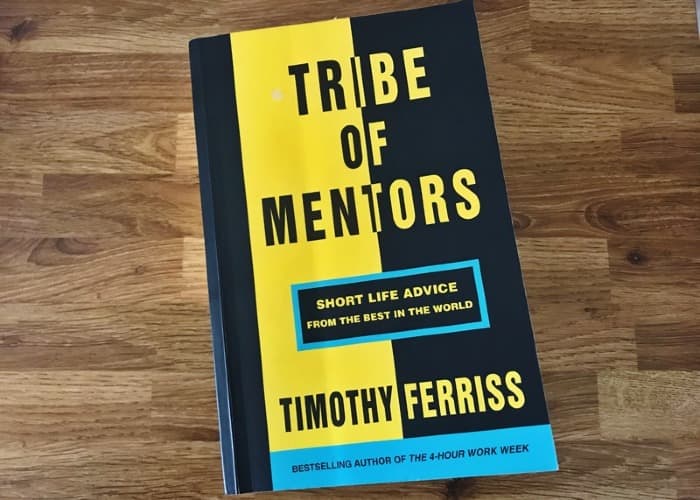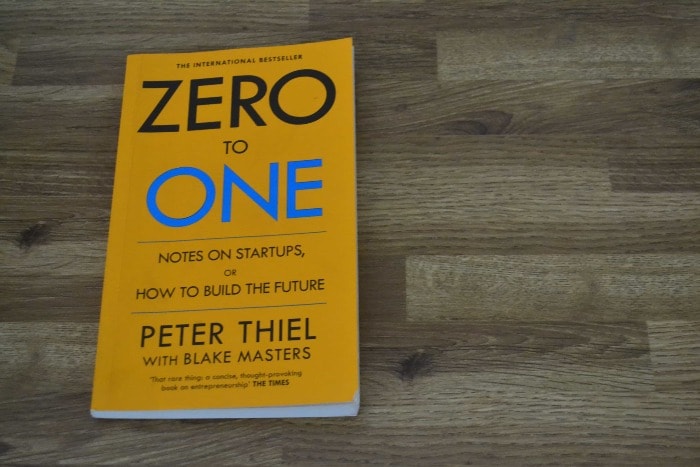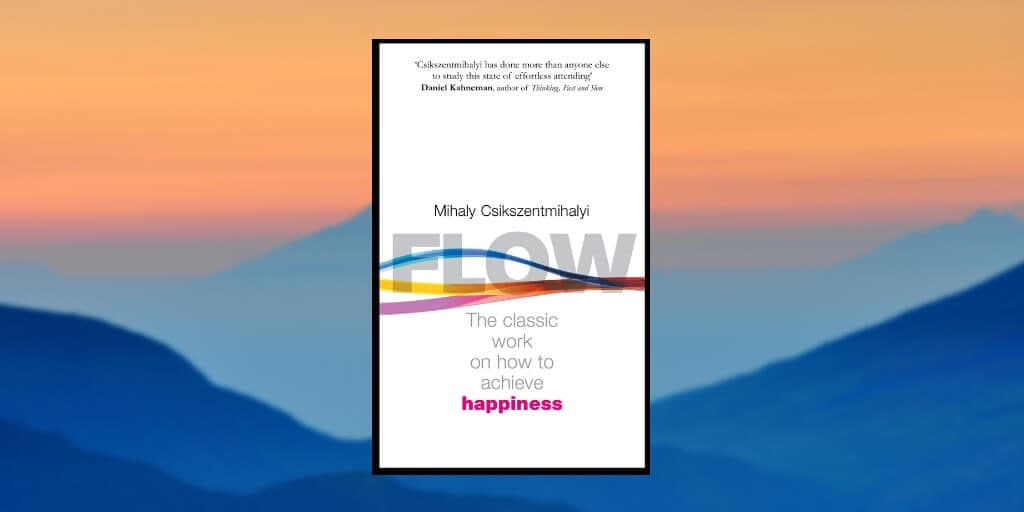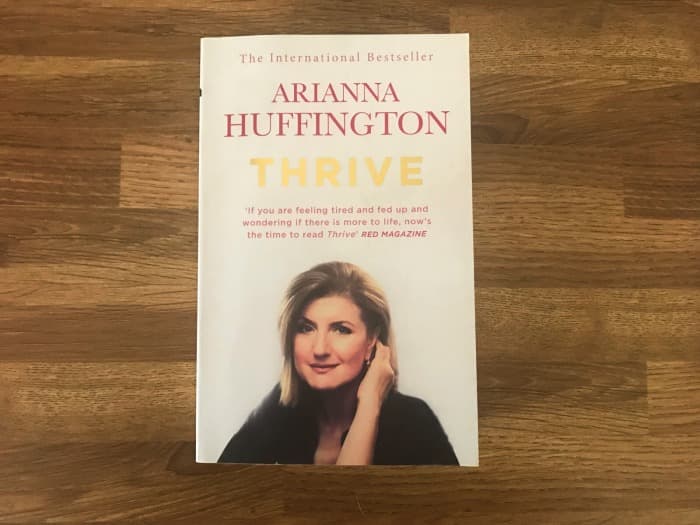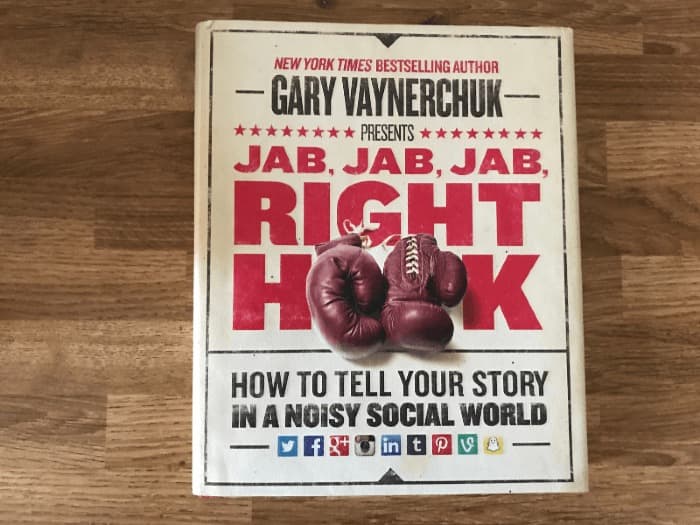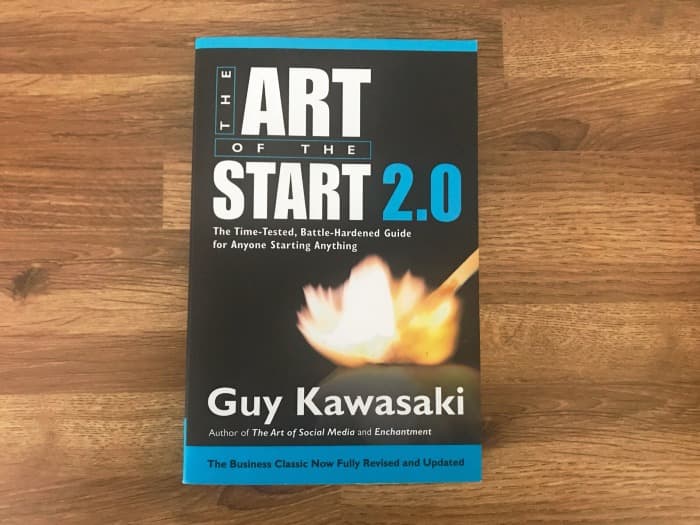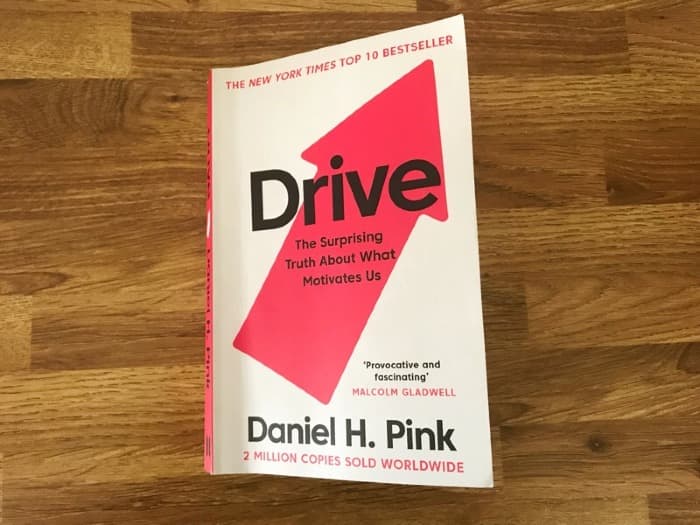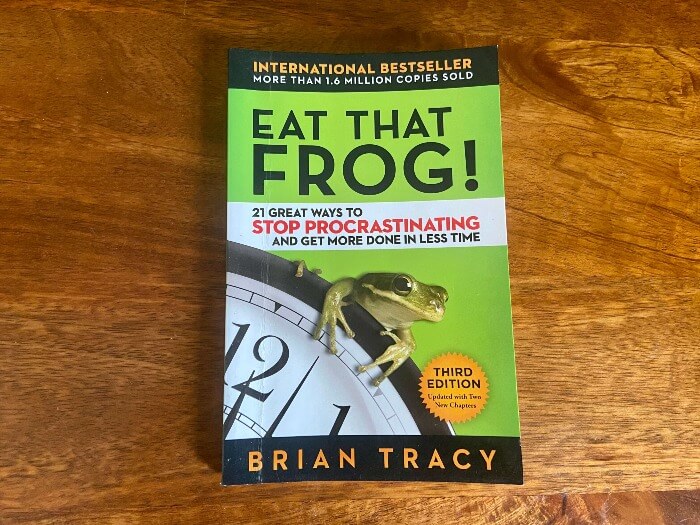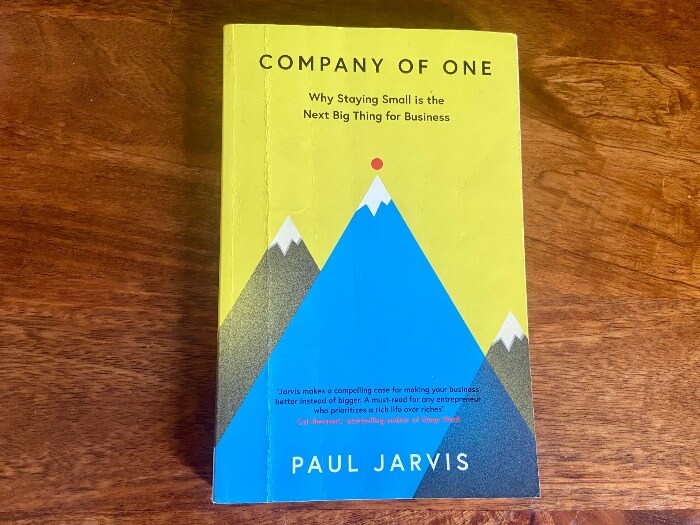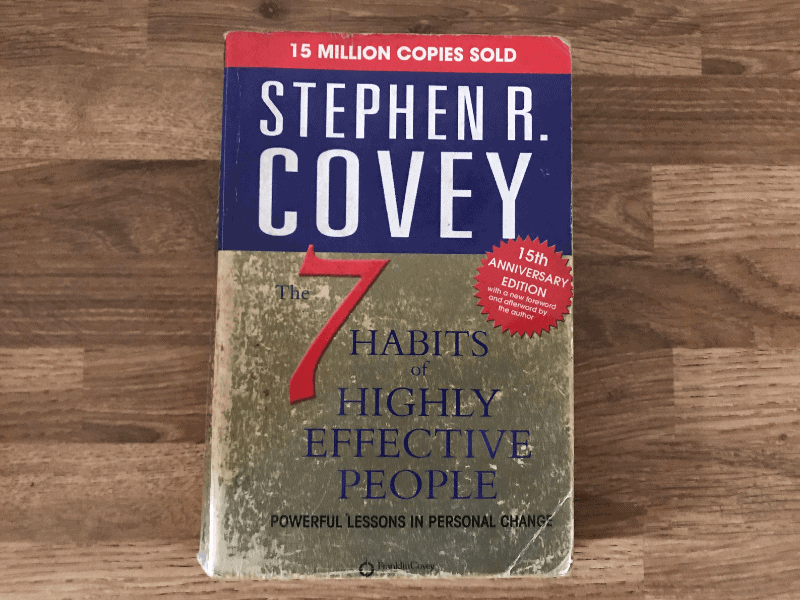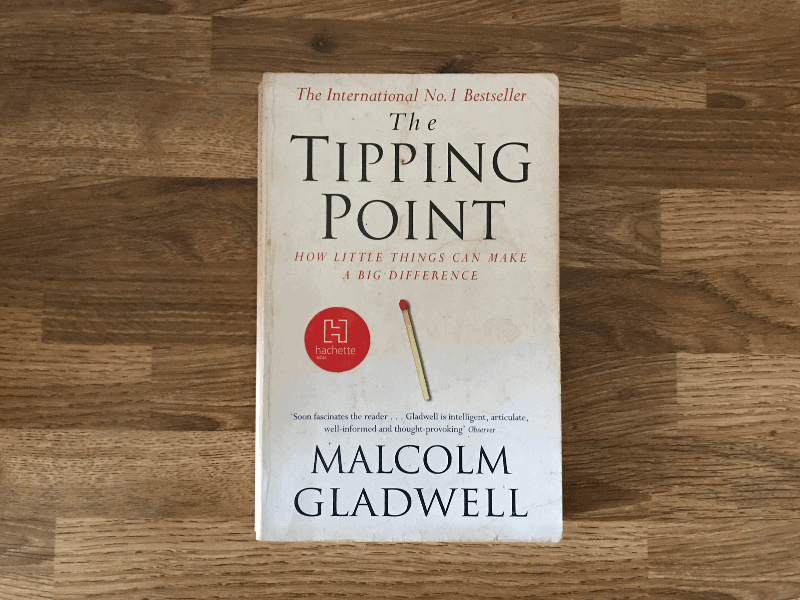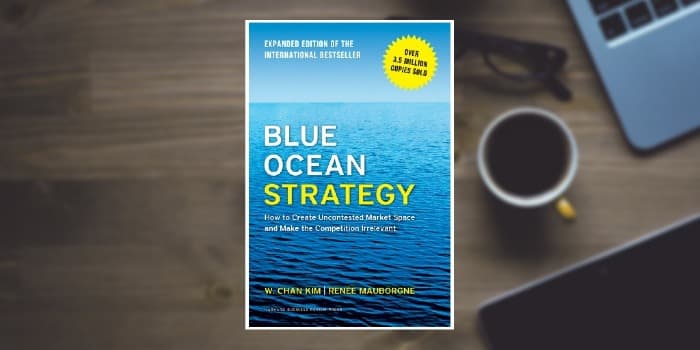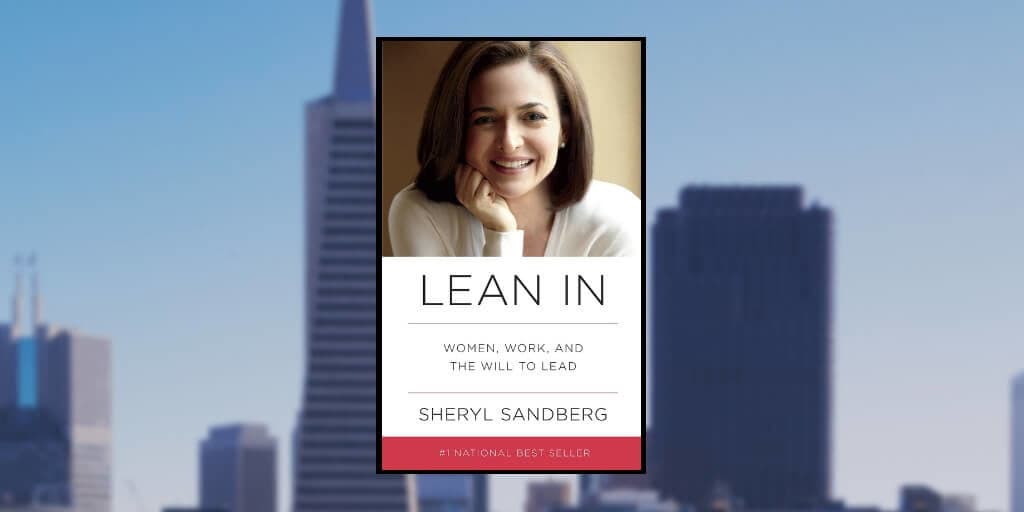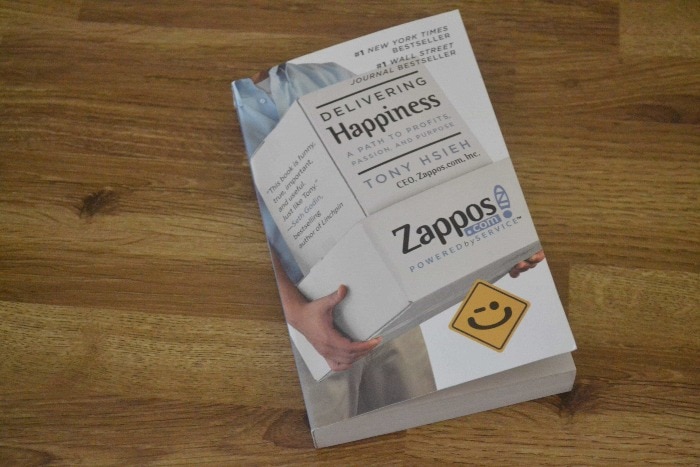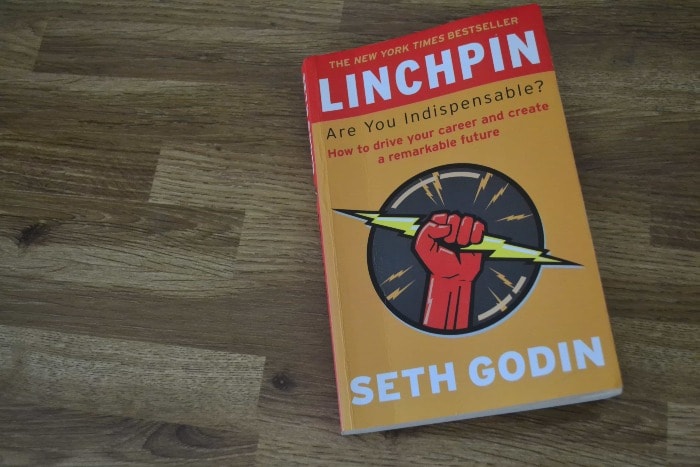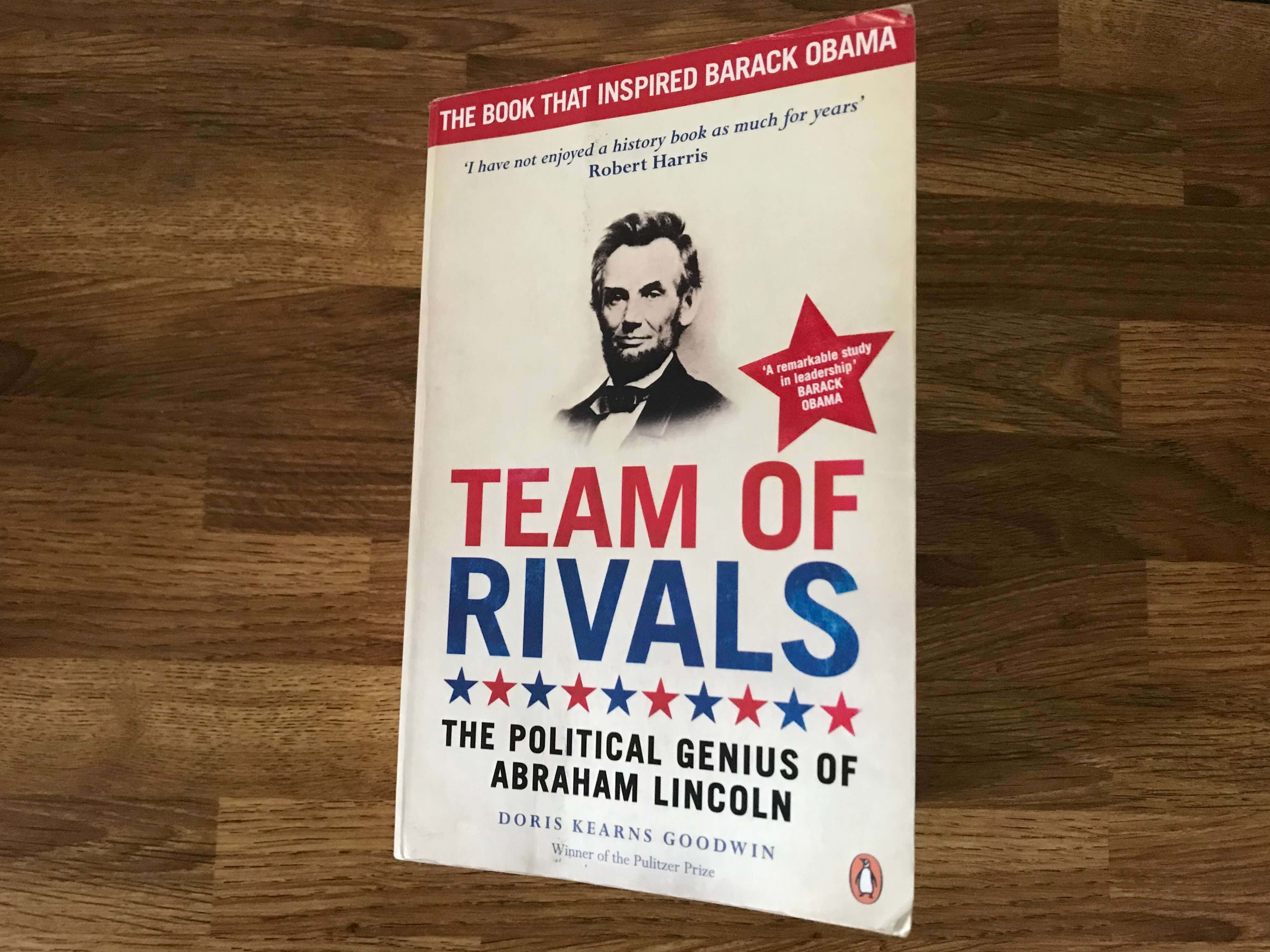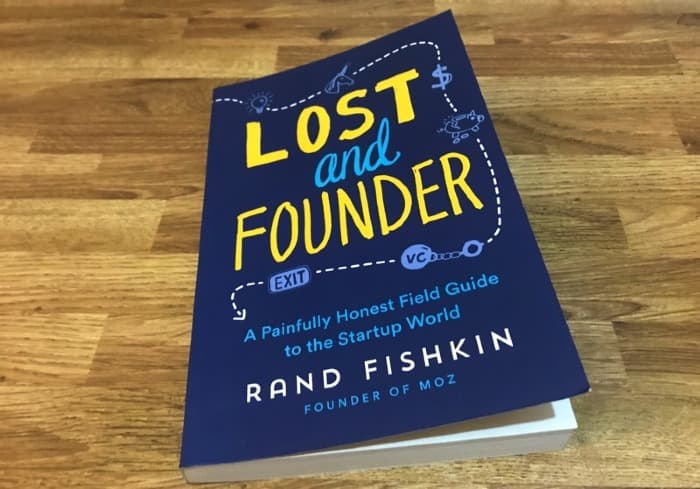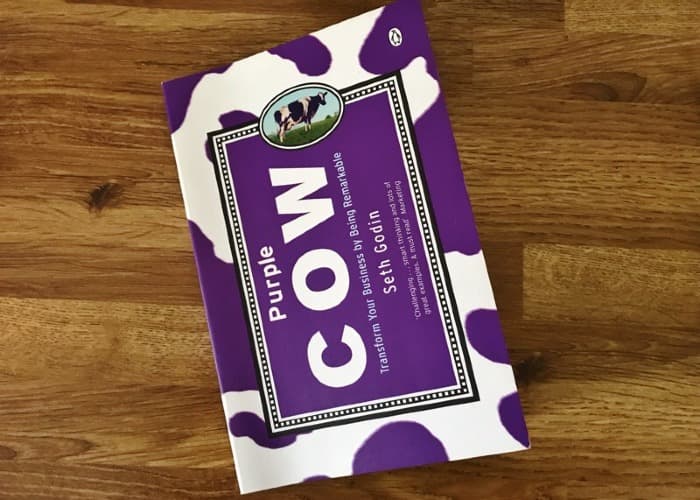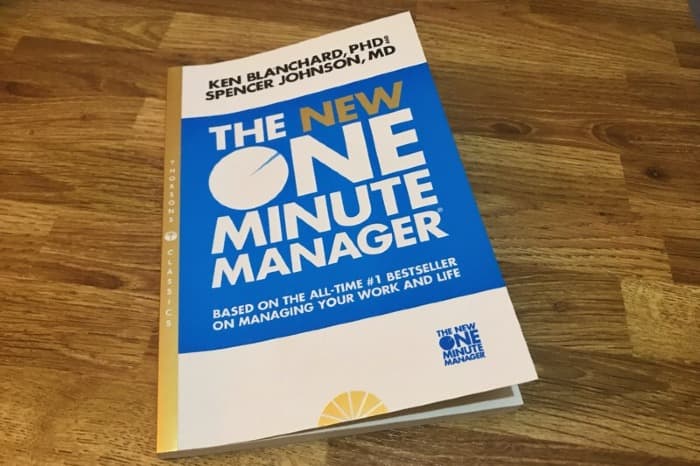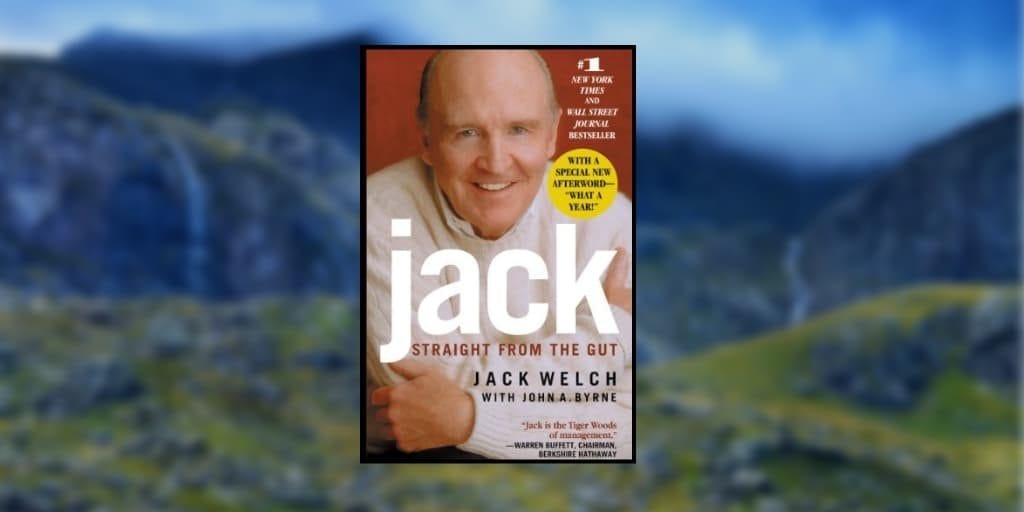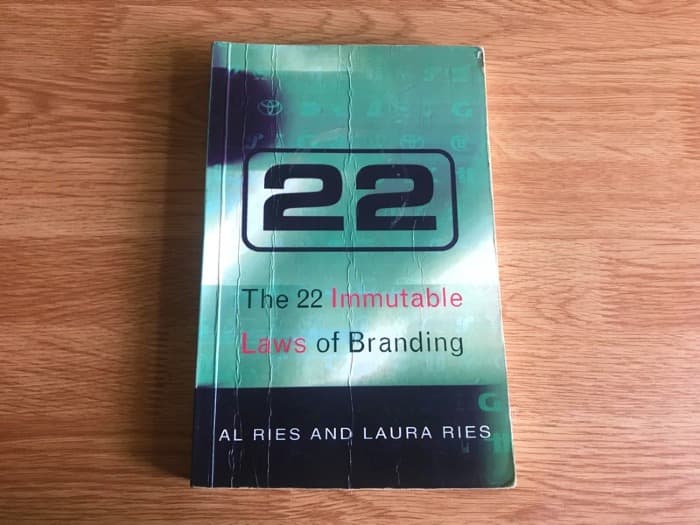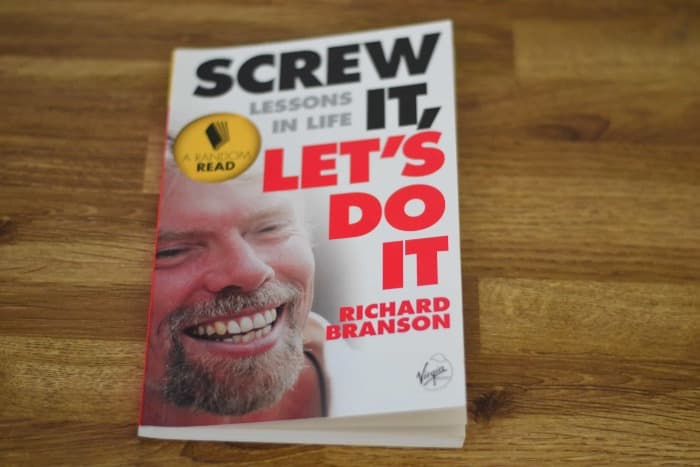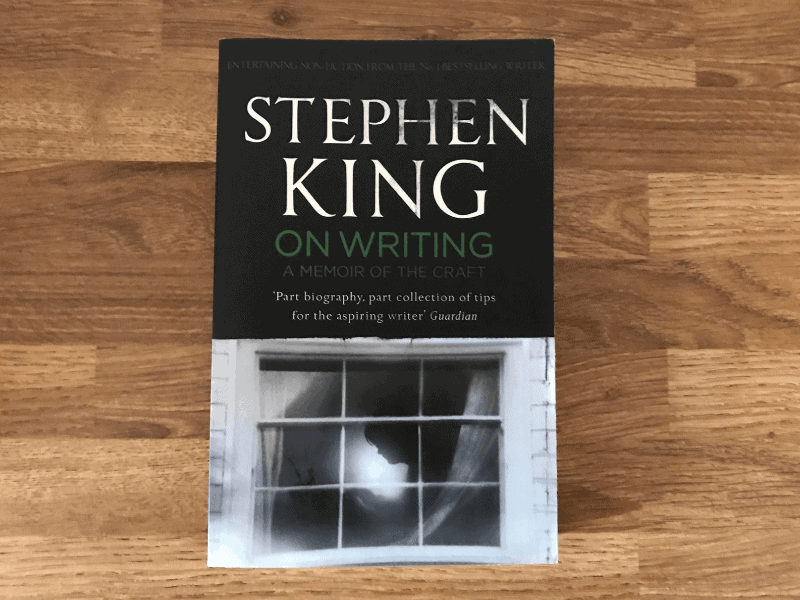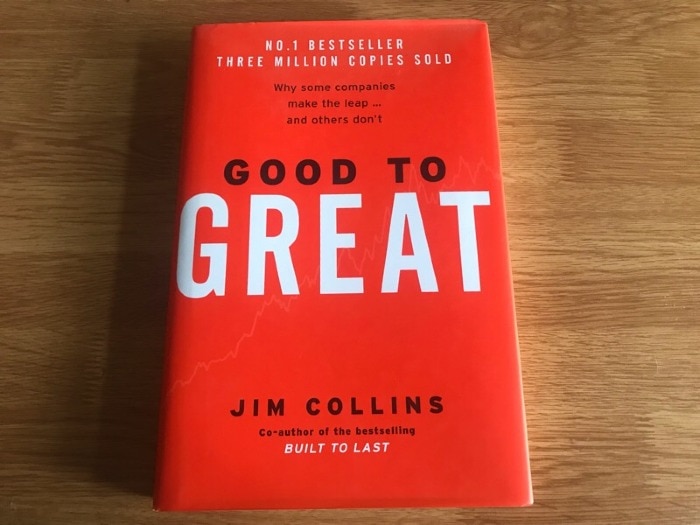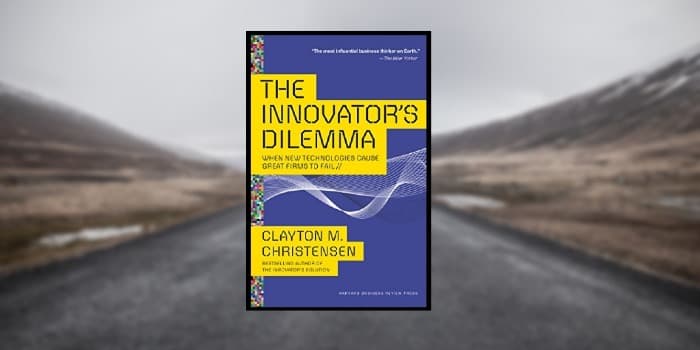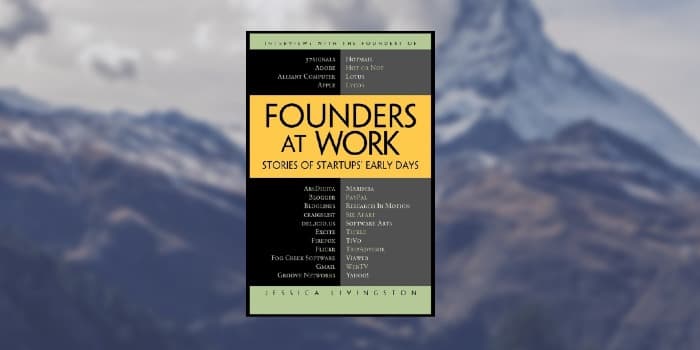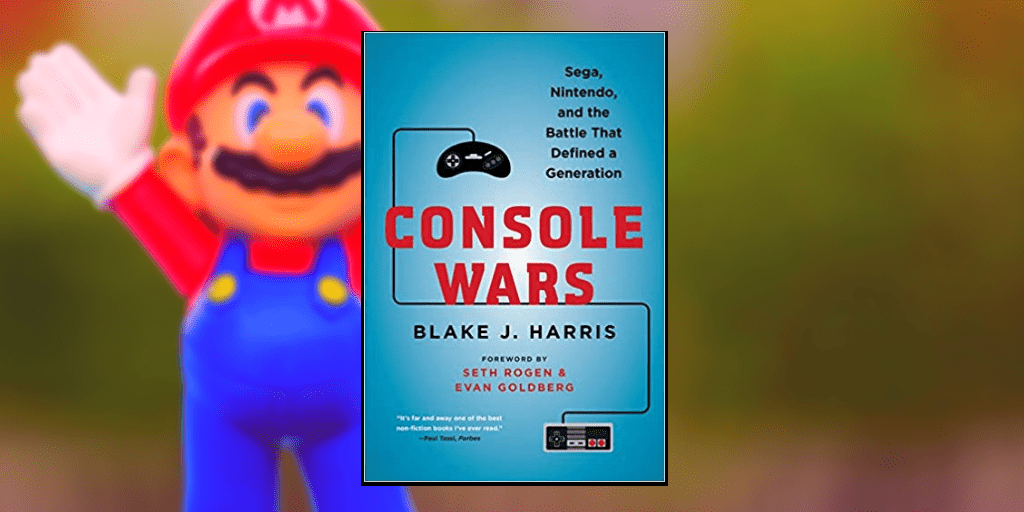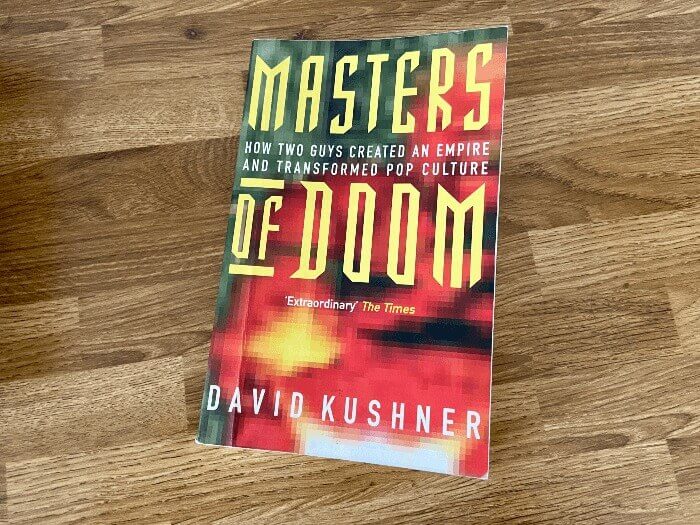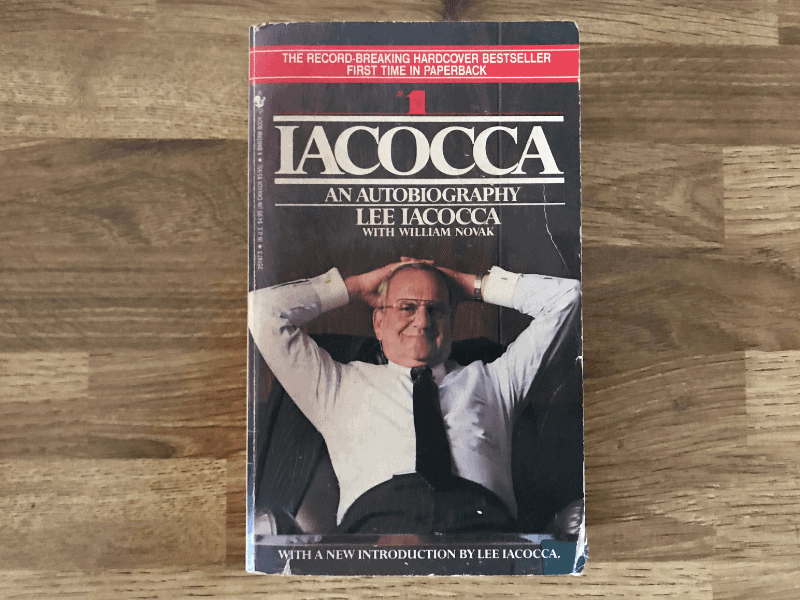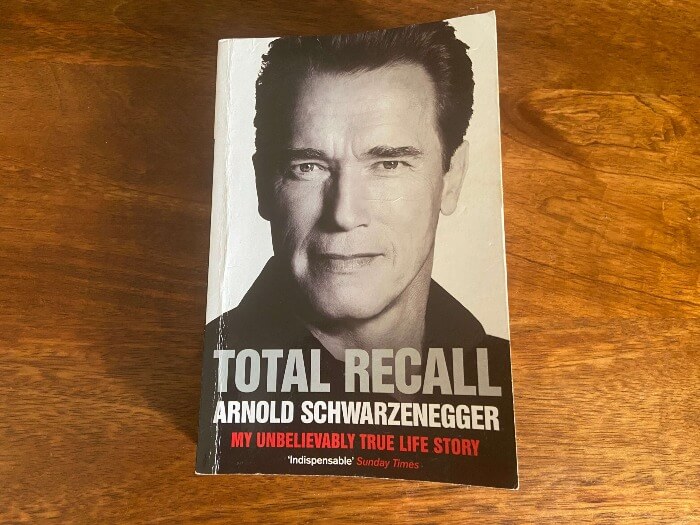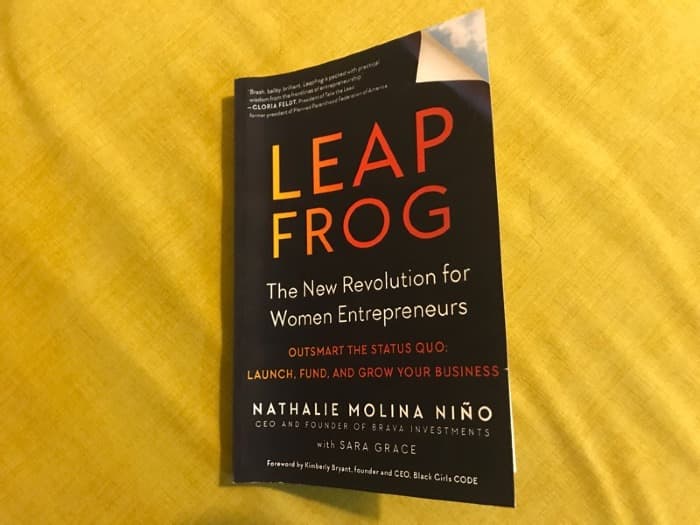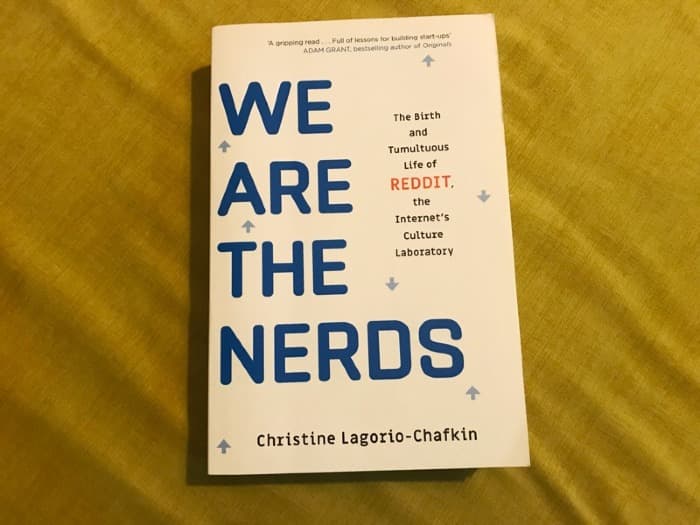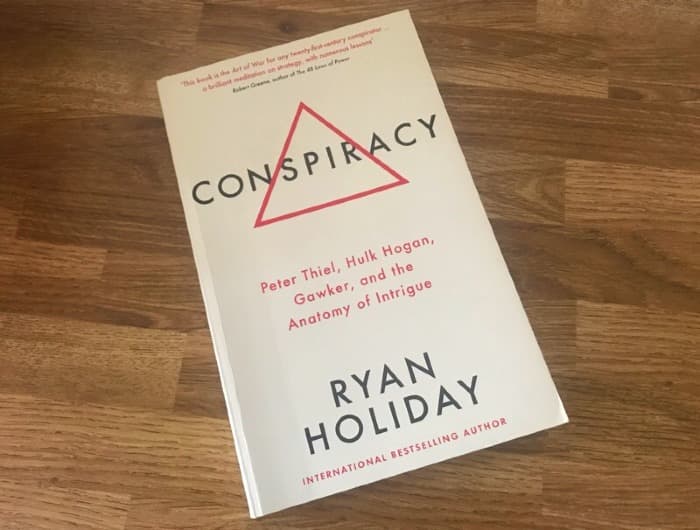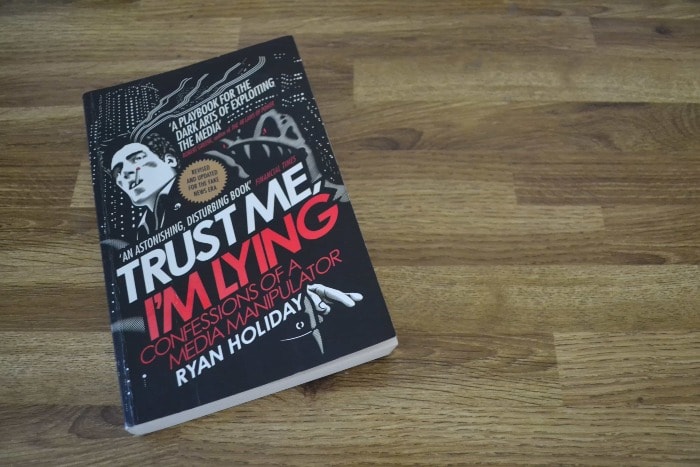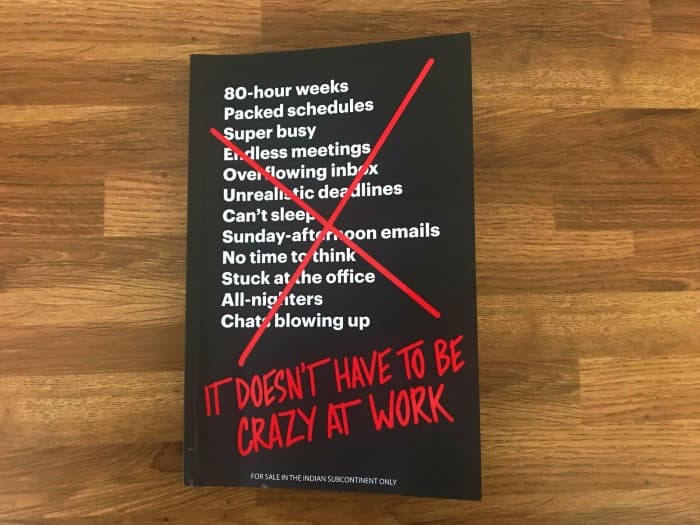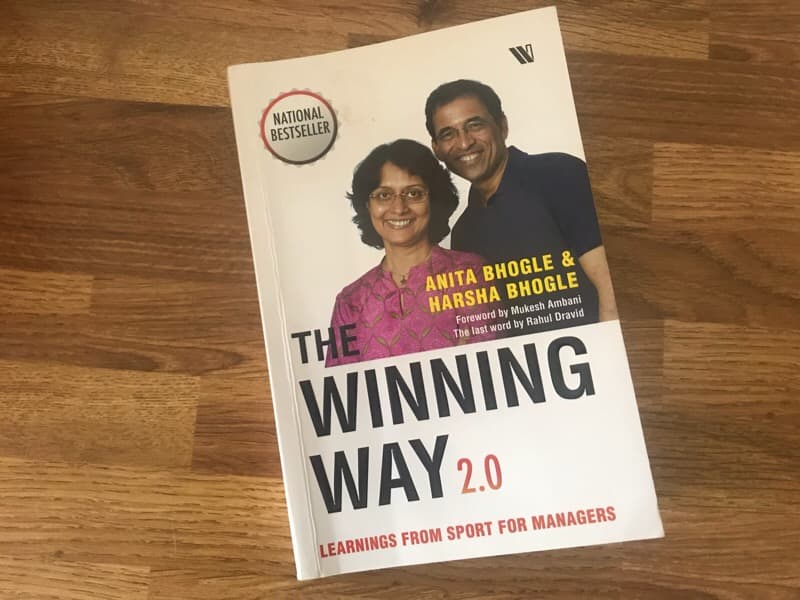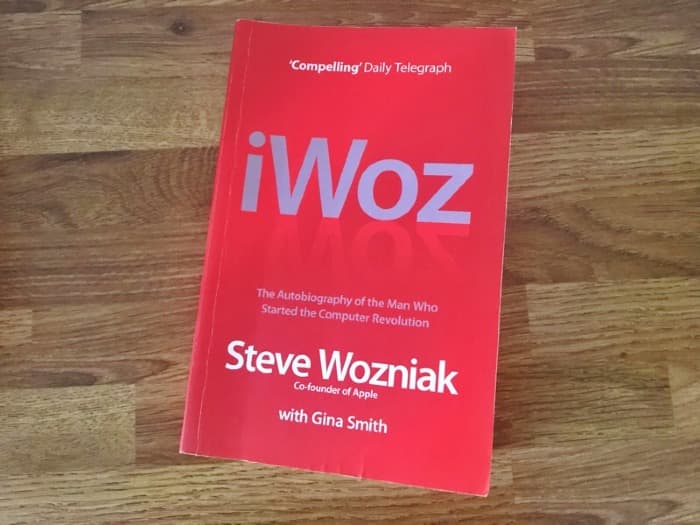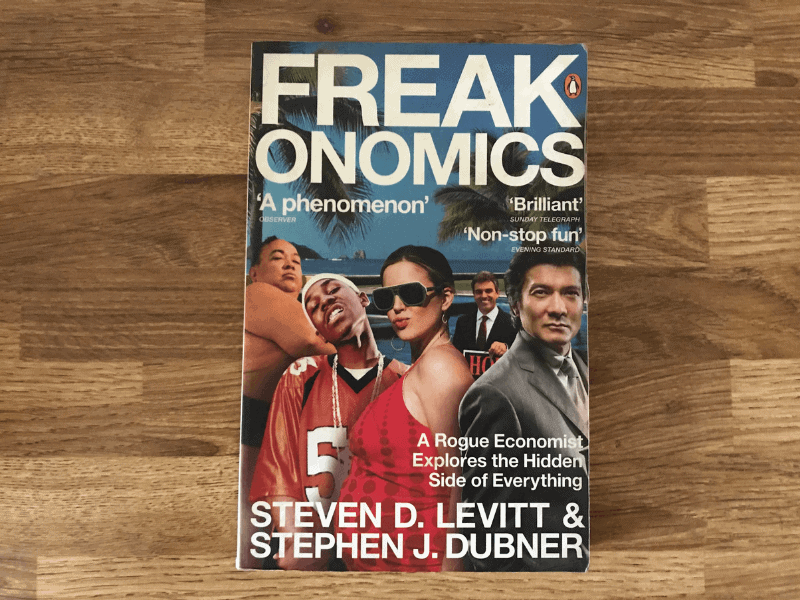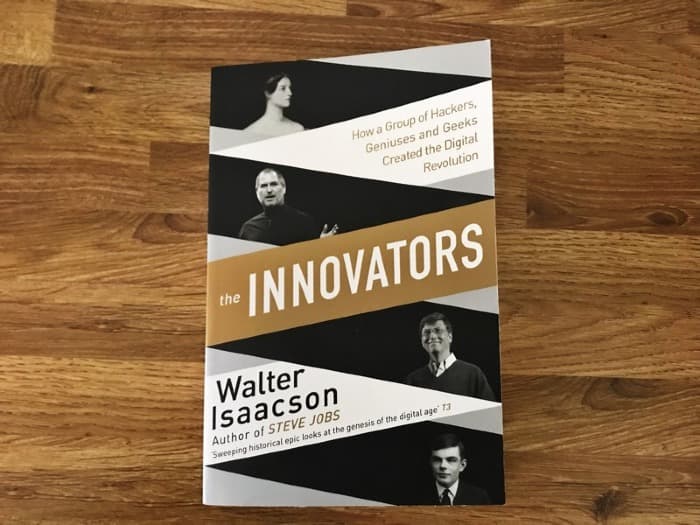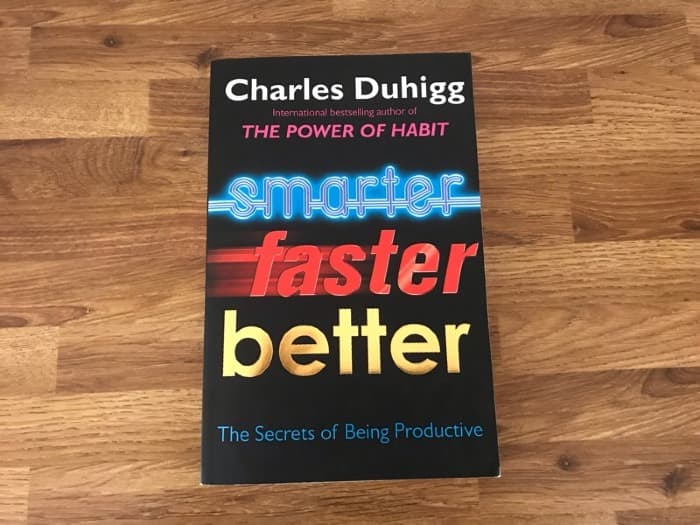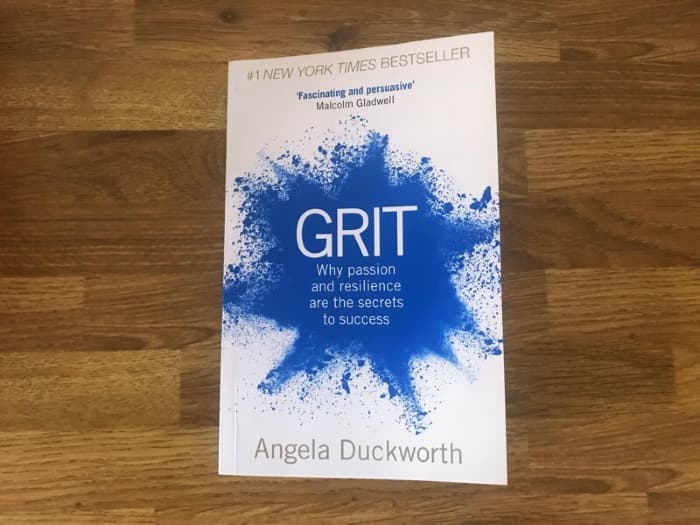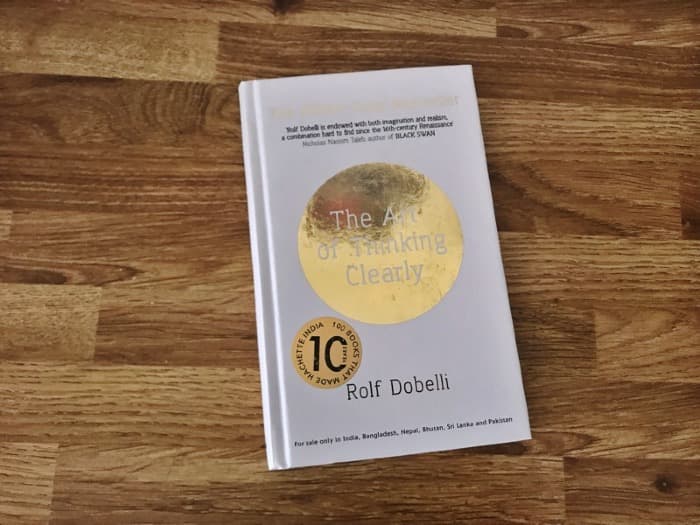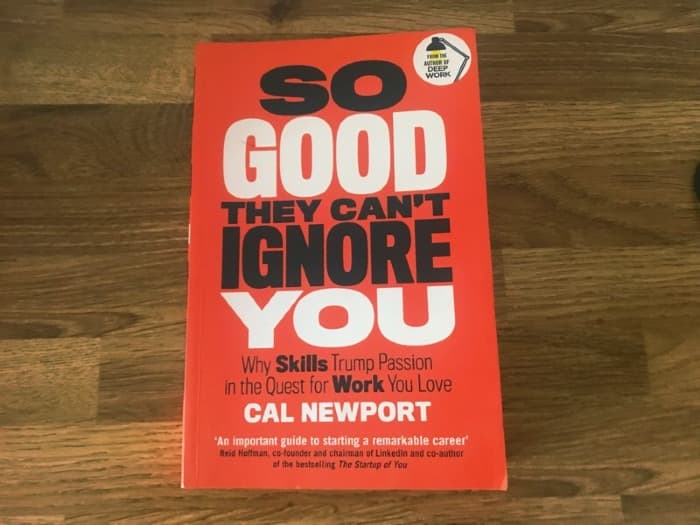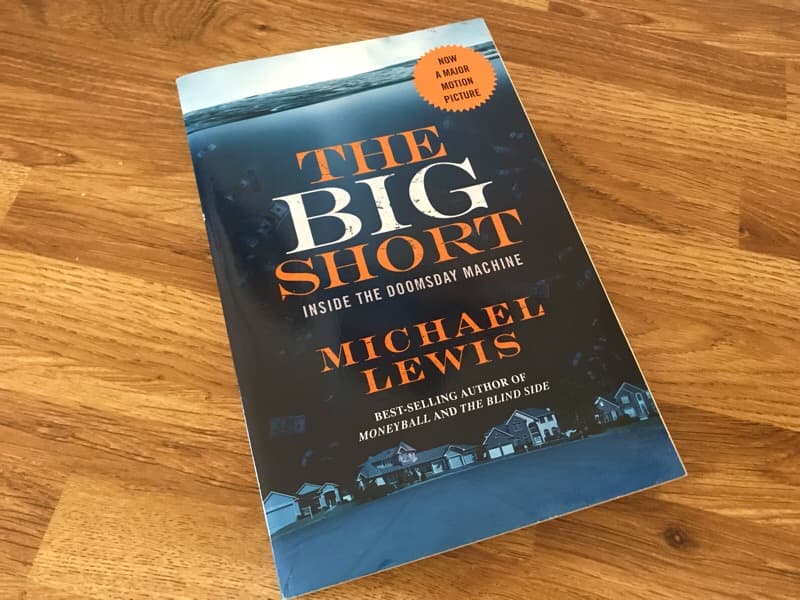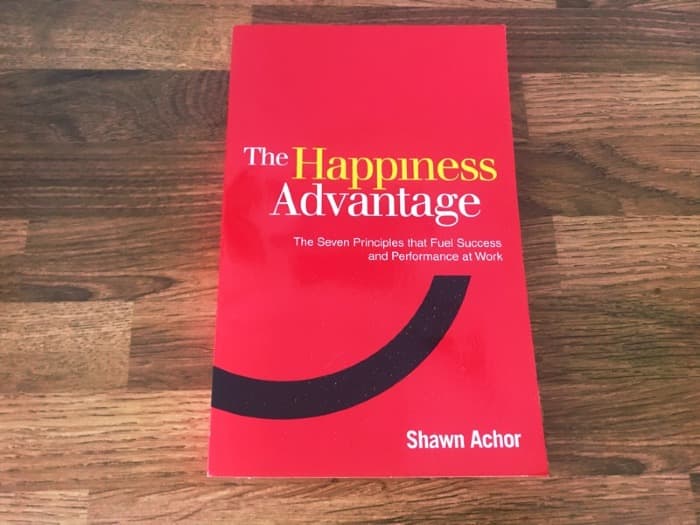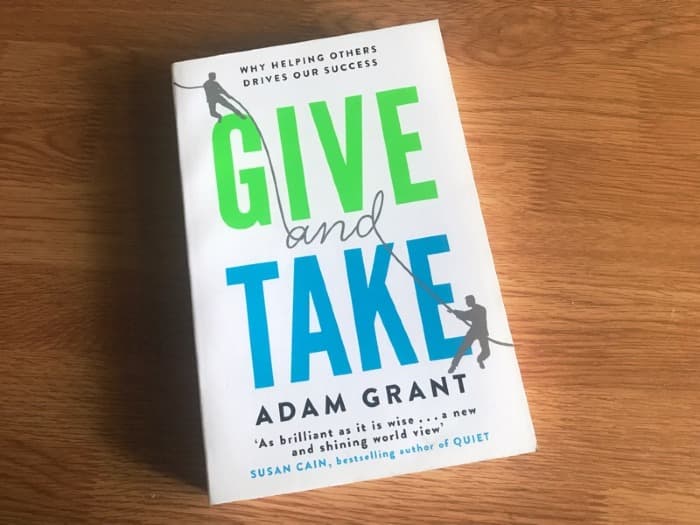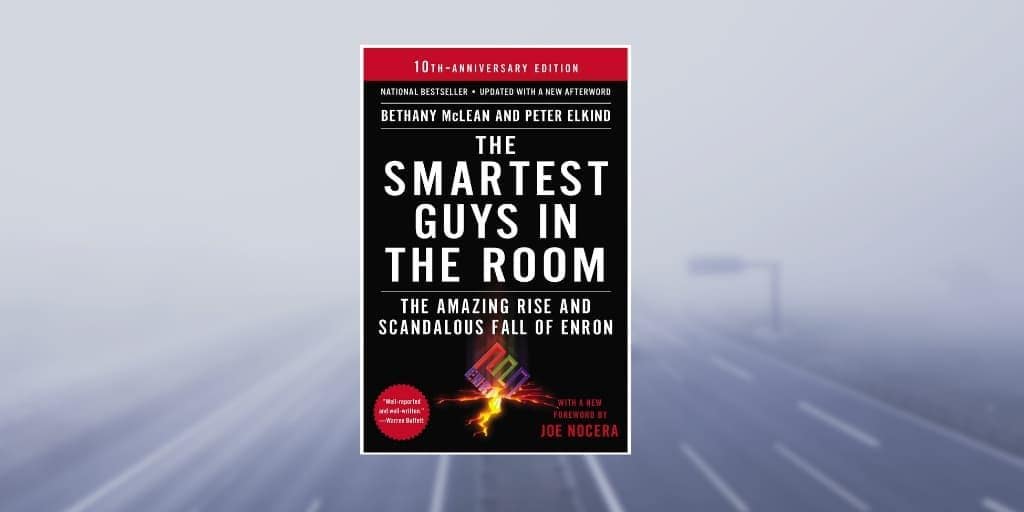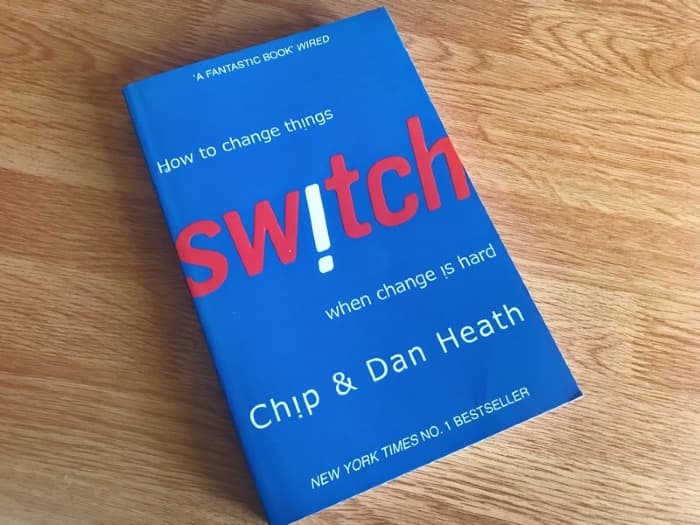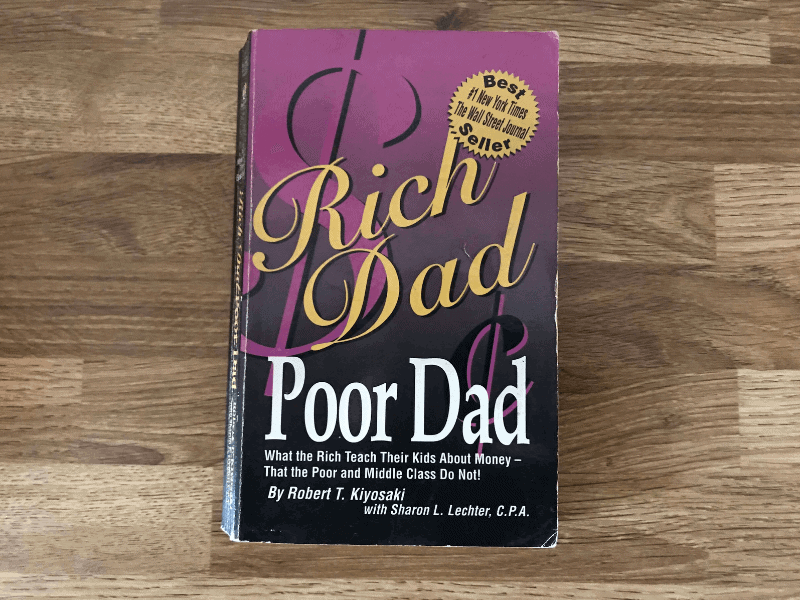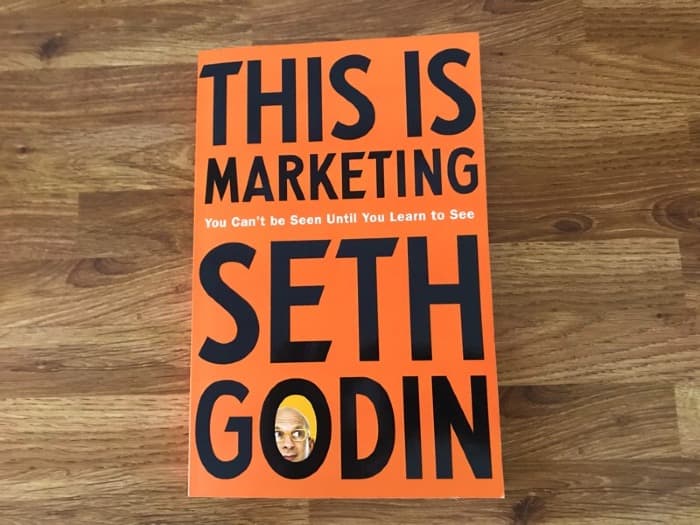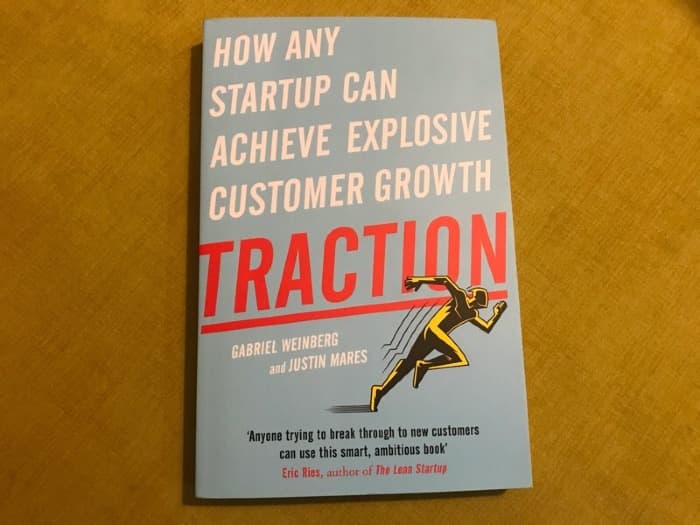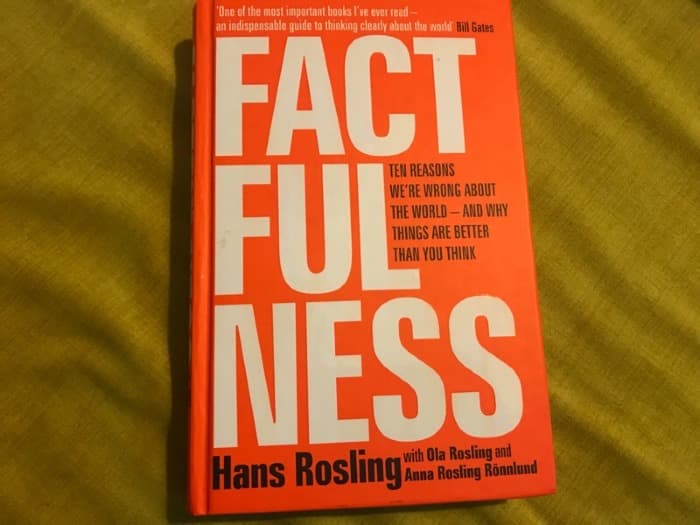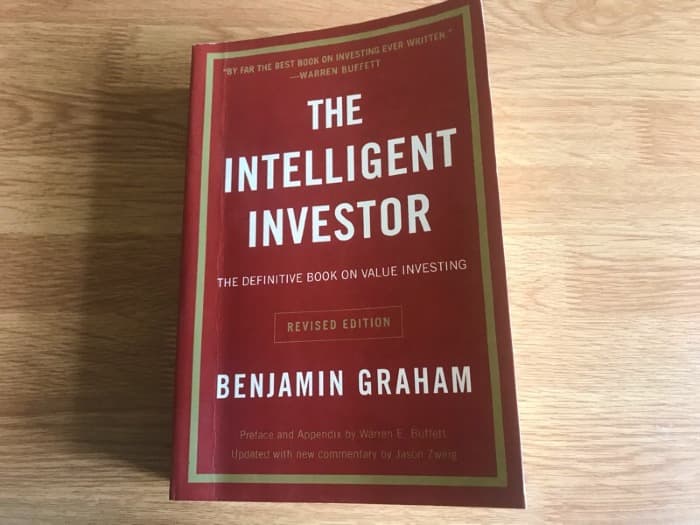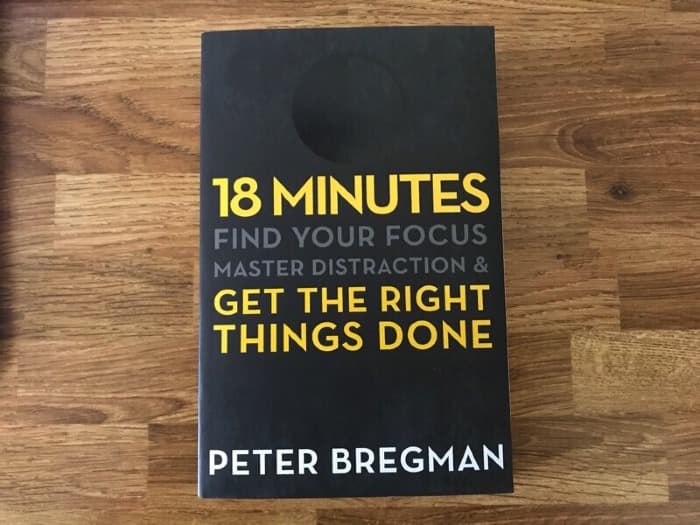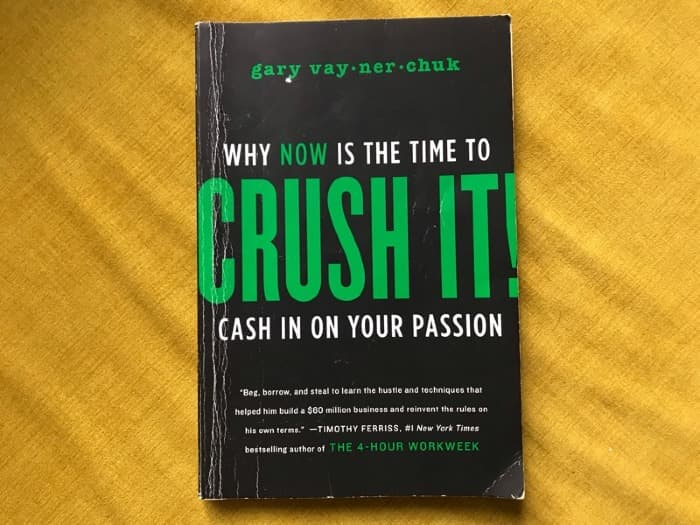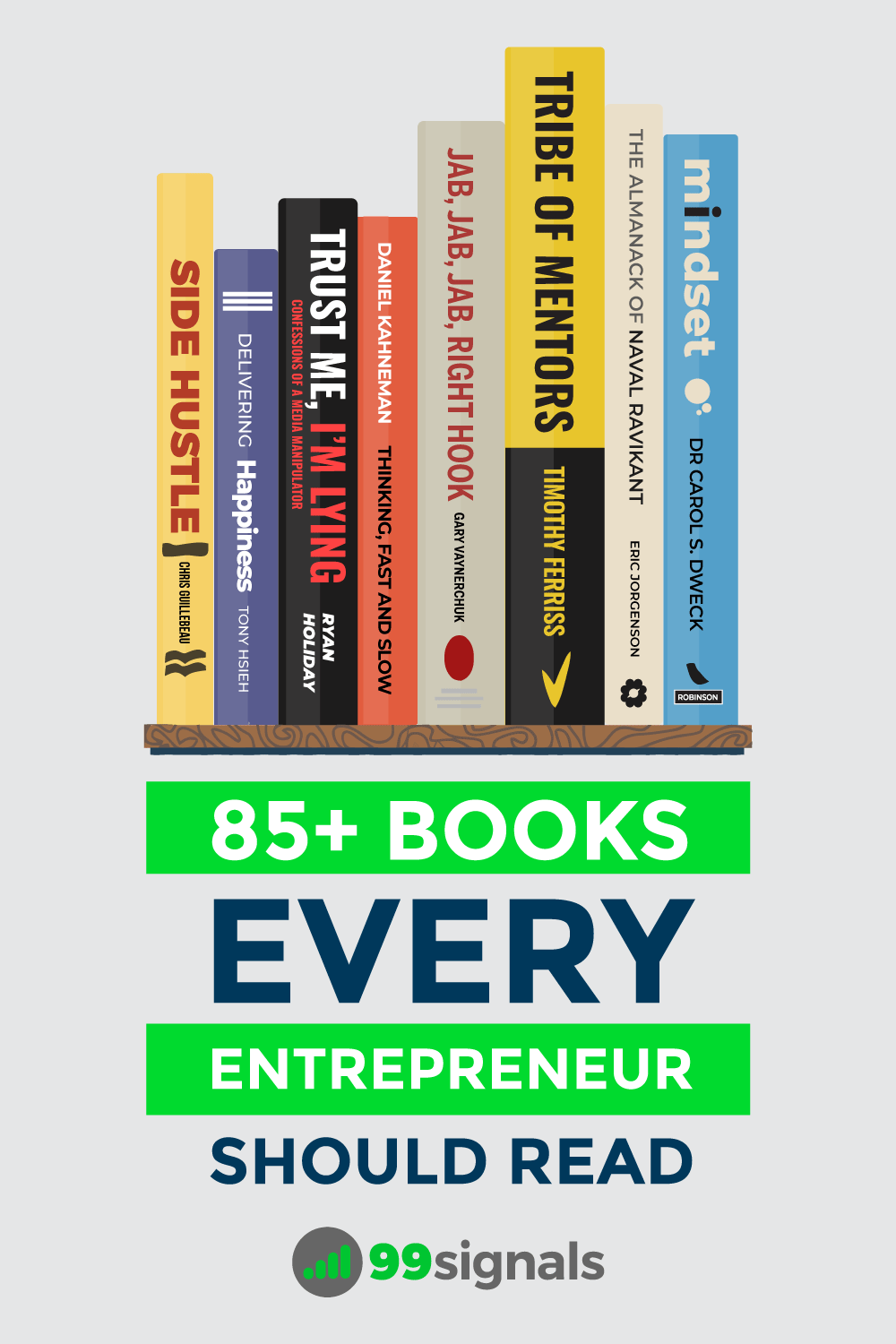Just as I was about to quit my 9-to-5 job to embark on an exciting entrepreneurial journey, I started binge-reading tons of business books to get myself in the right frame of mind. A few of the books featured here played a huge role in giving me that much-needed encouragement while others helped me navigate the challenges of business. Ultimately, these books helped me grow, both professionally and personally, and now I’m recommending these books to you. I hope they have the same influence on you and help you become a better entrepreneur. Side note: This article took me a long time to write. Originally I wanted it to be a small list of my 15 favorite business books, but then as I kept reading more business books, I thought it’d be worthwhile to make it an exhaustive list of the top business books for entrepreneurs. That said, this is not the final iteration of this article. I’ll keep updating this article as and when I read new business books which are worth recommending. Below are 85+ best books I’d recommend to both new and seasoned entrepreneurs.
85+ Must-Read Books for Entrepreneurs
1. Mindset by Carol S. Dweck
85+ Must-Read Books for Entrepreneurs1. Mindset by Carol S. Dweck2. The Almanack of Naval Ravikant by Eric Jorgenson3. Made to Stick by Chip Heath and Dan Heath4. The Power of Habit by Charles Duhigg5. The Lean Startup by Eric Ries6. Never Split the Difference by Chris Voss7. Bad Blood by John Carreyrou8. Atomic Habits by James Clear9. Influence by Robert B. Cialdini10. Rework by Jason Fried and David Heinemeier Hansson11. Steal Like An Artist by Austin Kleon12. Tools of Titans by Tim Ferriss13. All Marketers Are Liars by Seth Godin14. The Subtle Art of Not Giving a F*ck by Mark Manson15. Quiet by Susan Cain16. Thinking, Fast and Slow by Daniel Kahneman17. Hooked by Nir Eyal with Ryan Hoover18. The 4-Hour Work Week by Tim Ferriss19. Ogilvy on Advertising by David Ogilvy20. Side Hustle by Chris Guillebeau21. Originals by Adam Grant22. #AskGaryVee by Gary Vaynerchuk23. Only the Paranoid Survive by Andrew S. Grove24. Crushing It by Gary Vaynerchuk25. Deep Work by Cal Newport26. Pre-suasion by Robert Cialdini27. Steve Jobs: The Exclusive Biography by Walter Isaacson28. Getting Things Done by David Allen29. Tribe of Mentors by Tim Ferriss30. Zero to One by Peter Thiel31. Flow by Mihaly Csikszentmihalyi32. Thrive by Arianna Huffington33. Jab, Jab, Jab, Right Hook by Gary Vaynerchuk34. The Art of the Start by Guy Kawasaki35. Drive by Daniel H. Pink36. Eat That Frog! by Brian Tracy37. Company of One by Paul Jarvis38. The 7 Habits of Highly Effective People by Stephen R. Covey39. The Tipping Point by Malcolm Gladwell40. Blue Ocean Strategy by Renée Mauborgne41. Lean In by Sheryl Sandberg42. Delivering Happiness by Tony Hsieh43. Linchpin by Seth Godin44. Team of Rivals by Doris Kearns Goodwin45. The Hard Thing About Hard Things by Ben Horowitz46. Lost and Founder by Rand Fishkin47. Purple Cow by Seth Godin48. The One Minute Manager by Kenneth Blanchard and Spencer Johnson49. Jack: Straight from the Gut by Jack Welch50. Made In Japan by Akio Morita51. The 22 Immutable Laws Of Branding by Al Ries and Laura Ries52. Screw It, Let’s Do It by Richard Branson53. On Writing: A Memoir of the Craft by Stephen King54. Good to Great by James C. Collins55. The Innovator’s Dilemma by Clayton M. Christensen56. Founders at Work by Jessica Livingston57. The $100 Startup by Chris Guillebeau58. Console Wars by Blake J. Harris59. Masters of Doom by David Kushner60. Iacocca: An Autobiography by Lee Iacocca and William Novak61. Total Recall by Arnold Schwarzenegger62. Leapfrog by Nathalie Molina Niño63. We Are the Nerds by Christine Lagorio-Chafkin64. Conspiracy by Ryan Holiday65. Trust Me, I’m Lying by Ryan Holiday66. It Doesn’t Have to Be Crazy at Work by Jason Fried and David Heinemeier67. The Winning Way by Harsha Bhogle and Anita Bhogle68. iWoz by Steve Wozniak69. Freakonomics by Steven D. Levitt & Stephen J. Dubner70. The Innovators by Walter Isaacson71. Smarter Faster Better by Charles Duhigg72. Grit by Angela Duckworth73. The Art of Thinking Clearly by Rolf Dobelli74. So Good They Can’t Ignore You by Cal Newport75. The Big Short by Michael Lewis76. The Happiness Advantage by Shawn Achor77. Give and Take by Adam Grant78. The Smartest Guys in the Room by Bethany McLean and Peter Elkind79. Switch by Chip Heath and Dan Heath80. Rich Dad, Poor Dad by Robert T. Kiyosaki 81. This is Marketing by Seth Godin82. Traction by Gabriel Weinberg and Justin Mares83. Factfulness by Hans Rosling84. The Intelligent Investor by Benjamin Graham85. 18 Minutes by Peter Bregman86. Crush It by Gary VaynerchukConclusion
Of all the business books I’ve read over the years, the concept explained by world-renowned Stanford University psychologist Carol S. Dweck in her book Mindset will stay with me the longest. In short, the book delves deeper into two mindsets that dominate our lives — fixed mindset and growth mindset. The fixed mindset limits our learning and makes us more concerned about how we’ll be judged by others. The growth mindset, on the other hand, is concerned with improving. When we are in the growth mindset, failure is not an indication of our potential — it’s a stepping stone to success and greater opportunities. While we are all a mixture of fixed and growth mindsets, it’s only when we truly embrace our growth mindset that we are empowered to take up new challenges, learn new things, and confront obstacles. As entrepreneurs, it’s important that we embrace growth mindset while taking up new challenges. As such, this book is required reading for anyone who wants to start their own business. Goodreads Rating: 4.07/5 (112,000+ ratings) My Rating: 5/5
2. The Almanack of Naval Ravikant by Eric Jorgenson
Naval Ravikant is a Silicon Valley entrepreneur and angel investor. He’s launched several successful startups, including AngelList, and invested in over 200 companies, including Uber, Twitter, and Clubhouse. Naval has been sharing his unique perspective on business, investing, and happiness on Twitter for over a decade, where he has amassed over a million followers. If you follow Naval on Twitter or have listened to his interviews on podcasts like The Tim Ferriss Show and The Joe Rogan Experience and have been impressed with the depth of his knowledge and wisdom, this book is for you. Eric Jorgenson neatly curates Naval’s philosophy on two of his most explored topics: wealth and happiness. The book is a collection of Naval’s reflections on these topics from different sources like tweets, transcripts, essays, blog posts, and podcast interviews. It’s full of lessons, anecdotes, and advice that every entrepreneur will cherish as a guide to lead a more fulfilling life. Side note: The entirety of this book is free to read at navalmanack.com. Goodreads Rating: 4.6/5 (7,000+ ratings) My Rating: 5/5
3. Made to Stick by Chip Heath and Dan Heath
The goal of this book is simple: to help you make your ideas stick. How do you make your ideas stick? By defeating the arch-nemesis of sticky messages — the Curse of Knowledge, which says that once you know something, it’s hard to imagine not knowing it. And that makes it hard for us to communicate our ideas clearly to our audience. In the book, Chip and Dan Heath explain how the Curse of Knowledge can be overcome by following the six principles of stickiness — Simple, Unexpected, Concrete, Credible, Emotional, Stories — called the SUCCESs checklist. Each of these principles is explained in detail in separate chapters with elaborate examples and illustrations (called ‘Idea Clinics’) to really drive home the message. Made to Stick is a must-read business book for entrepreneurs and marketers who’d like to master the art of storytelling and create compelling marketing content for their products or services. Goodreads Rating: 3.96/5 (80,000+ ratings) My Rating: 5/5
4. The Power of Habit by Charles Duhigg
We are shaped by our habits. Whether they are good ones, like exercising or meditating, or bad ones, like smoking and gambling, our habits play a huge role in our lives and define who we are as an individual. In The Power of Habit, Charles Duhigg, a Pulitzer-prize-winning journalist and author, explains in detail how habits are formed and how we can change them, both on an individual and on an organizational level. Filled with interesting findings and anecdotes to elaborate the claims, The Power of Habit is a must-read for all entrepreneurs who are looking to cultivate good habits and eliminate bad ones to run successful businesses. Goodreads Rating: 4.1/5 (300,000+ ratings) My Rating: 4/5
5. The Lean Startup by Eric Ries
Startups need to be managed differently from established companies. That’s the core message of The Lean Startup by Eric Ries, a business book that applies the concepts of lean manufacturing and agile development to the startup process. Ries goes on to explain the purpose of a startup — to find a sustainable business model and how validated learning is the most effective way startups can achieve sustainability. Some of the ideas that resonated with me the most were concepts like minimal viable product (MVP), build-measure-learn feedback loop, and pivot. Goodreads Rating: 4.07/5 (159,000+ ratings) My Rating: 4/5
6. Never Split the Difference by Chris Voss
Negotiation is often called “the art of letting someone else have your way.” Successful entrepreneurs are often powerful negotiators as well. Luckily, negotiation is a skill that can be developed and improved. If you’d like to improve your negotiation skills, there’s no better book than Never Split the Difference by Chris Voss. Chris Voss is a former international hostage negotiator for the FBI and in Never Split the Difference, he reveals the negotiation skills and tactics he used at the FBI in some of the toughest scenarios. In the book, Voss shares nine effective negotiation principles you can use to become more persuasive in both your professional and personal life. This book is required reading for all entrepreneurs who’d like to hone their negotiation skills and gain a competitive edge over their rivals. Goodreads Rating: 4.40/5 (20,000+ ratings) My Rating: 4/5
7. Bad Blood by John Carreyrou
This book is an absolute page turner. It covers the rise and fall of Theranos, a multibillion dollar biotech “unicorn” that promised to transform the healthcare industry with a machine that would make blood tests significantly faster and easier. For a long time, Elizabeth Holmes was considered a Silicon Valley wunderkind. Her health technology company Theranos was all set to launch a device that would revolutionize the healthcare industry and make blood testing easier and less painful. Holmes herself was hailed as the next Steve Jobs. The only problem? The technology didn’t work. For many years, Holmes deceived and misled investors and business partners before her fraudulent practices were finally exposed. John Carreyrou, the author of Bad Blood and a Pulitzer-winning journalist at the Wall Street Journal, was the first reporter to investigate Theranos and its astonishing claims. In late 2015, Wall Street Journal published several articles, questioning Theranos’ claims and techniques. At the time, Theranos was valued at $9 billion. By early 2017, the company’s value was zero. Bad Blood provides the full inside story into the rise and fall of Theranos. It’s a story of how Elizabeth Holmes deceived and manipulated some of the smartest minds in the world and how she used intimidation tactics to silence her critics. Goodreads Rating: 4.48/5 (67,000+ ratings) My Rating: 5/5
8. Atomic Habits by James Clear
If you need a step-by-step guide to building better habits, there’s no better book than James Clear’s Atomic Habits. In this groundbreaking book, world-renowned habits expert James Clear provides a highly actionable and proven framework for creating good habits and shaking off bad ones. Built on the principles covered in Charles Duhigg’s The Power of Habit (see #4), Atomic Habits offers a more practical framework that anyone can apply to make positive changes in their life. Clear argues that real change in our behavior comes from the compound effect of tiny changes we make on a daily basis. These tiny changes, when done consistently, can transform into habits and lead to greater results. As James Clear writes, “The seed of every habit is a single, tiny decision. But as that decision is repeated, a habit sprouts and grows stronger.” Drawing on scientific research and examples from different fields (biology, neuroscience, philosophy, psychology, and more), Atomic Habits provides a solid roadmap to improve your productivity, motivation, and happiness. Goodreads Rating: 4.36/5 (255,000+ ratings) My Rating: 5/5
9. Influence by Robert B. Cialdini
Robert Cialdini is considered an expert in the field of influence and persuasion. And it’s largely due to his book Influence: The Psychology of Persuasion which was published in 1984. In Influence, Cialdini explains in detail six fundamental principles of persuasion: reciprocity, commitment and consistency, social proof, authority, liking, and scarcity. Influence will help you understand the psychology behind persuasive techniques employed by skilled marketers and salespeople, honing your own persuasion skills, while also arming you against tactics commonly used by manipulators. Goodreads Rating: 4.18/5 (74,000+ ratings) My Rating: 4/5
10. Rework by Jason Fried and David Heinemeier Hansson
Rework is unlike any other business book you’ll ever read. Written by founders of Basecamp (formerly 37signals), Rework contains unconventional business advice that may just be what you are looking for while venturing out on your own. It’s a quick read with hundreds of amazingly simple rules to run your business, broken down into bite-sized chapters. If you need some motivation to get started with your business idea, this is the book you should read. Goodreads Rating: 3.94/5 (121,000+ ratings) My Rating: 5/5 Recommended reading: 7 Business Lessons I Learned from Rework by Jason Fried & David Heinemeier Hansson
11. Steal Like An Artist by Austin Kleon
Originality is overrated. All creative work builds on what came before and is a mashup of influences. In this short but nifty guide to creativity, bestselling author Austin Kleon shares ten principles to help readers embrace their artistic side and forge their own unique path. At the outset, Kleon makes a distinction between good theft and bad theft. Bad theft is when you blatantly rip off and plagiarize the work of others and pass it as your own. Good theft, on the other hand, is when you deeply study the work of your heroes, reverse-engineer and remix their work, and build something unique. When you emulate the work of others, you end up finding your own voice. If you’re struggling through a creative block, this book will teach you how to look at the world like an artist and discover your own creative path. Goodreads Rating: 3.94/5 (230,000+ ratings) My Rating: 4/5
12. Tools of Titans by Tim Ferriss
Tim Ferriss is one of the most successful entrepreneurs of our generation and the New York Times best-selling author of The 4-Hour Workweek (see #18). His podcast The Tim Ferriss Show is often the #1 business podcast on all of Apple Podcasts. He has interviewed over 200 guests on his podcast, ranging from celebrities and star athletes to successful entrepreneurs and self-help gurus. Tools of Titans draws heavily from Ferriss’ podcast and contains interviews of world-class performers from different walks of life who reveal the different tools and tactics they’ve used to achieve tremendous success both in personal and professional capacity. The book is divided into three different sections — Healthy, Wealthy, and Wise — each section features interviews, tools, advice, and life hacks. Goodreads Rating: 4.20/5 (18,000+ ratings) My Rating: 4/5
13. All Marketers Are Liars by Seth Godin
Seth Godin is an influential marketing thought leader, entrepreneur, and the author of 19 international bestselling books, some of which you can find in this list. All Marketers Are Liars explores the concept of storytelling and why it’s so important for marketers to tell authentic stories that resonate with consumers. According to Godin, it’s not the product that a consumer buys, but the story behind the product. And all successful marketers tell engaging stories. It’s one of the most compelling business books I’ve ever read and it’s highly recommended to all marketers and entrepreneurs. To learn more about my thoughts on the book, please check out this article — 7 Marketing Lessons I Learned from “All Marketers Are Liars” by Seth Godin. Goodreads Rating: 3.90/5 (11,900+ ratings) My Rating: 4/5
14. The Subtle Art of Not Giving a F*ck by Mark Manson
Amusing title aside, this book can change your perspective on life. Mark Manson, the author of this book, is a star blogger with more than two million readers. With his book The Subtle Art of Not Giving a F*ck, he makes a compelling argument, backed by academic research, for empowering ourselves by embracing our flaws and limitations. It’s a humorous book with interesting anecdotes and an important life lesson you’ll never forget. Goodreads Rating: 3.92/5 (600,000+ ratings) My Rating: 4/5
15. Quiet by Susan Cain
Being an introvert, I’ve often wondered if extroverts have an unfair advantage when it comes to entrepreneurship. After all, extroverts tend to be more social, enjoy teamwork, and always like being the center of attention — all of which are crucial personality traits required when you’re starting a new business. That said, introversion has its own unique strengths and attributes — less obvious but no less formidable. In her international bestseller Quiet, Susan Cain shows how our society undervalues introverts and gives introverts the tools to take full advantage of their strengths. In this book, you’ll learn how prominent figures like Eleanor Roosevelt, Mahatma Gandhi, and Warren Buffet achieved what they did not in spite of but because of their introversion. Goodreads Rating: 4.06/5 (261,000+ ratings) My Rating: 4/5
16. Thinking, Fast and Slow by Daniel Kahneman
Thinking, Fast and Slow summarizes decades of research undertaken by Nobel Memorial Prize winner Daniel Kahneman. In the book, Kahneman explains that our mind has two systems — the first system acts instinctively and requires little effort while the second is more deliberate and requires much more of our attention. According to Kahneman, our thoughts and actions depend on which of the two systems is in control of our brain at the time. In other words, we either rely on intuition or deliberation. Thinking, Fast and Slow is a thought-provoking read which will make you question the major decisions you have taken in your life. Goodreads Rating: 4.13/5 (215,000+ ratings) My Rating: 4/5
17. Hooked by Nir Eyal with Ryan Hoover
Hooked reveals the secrets that habit-forming companies use to link their products or services to the users’ daily routines and emotions. This book is more like a how-to guide for building better products. Nir Eyal explains the concept with vivid examples of companies using the so-called Hook model — a four-step process followed meticulously by companies to subtly encourage customer behavior. Hooked is mandatory reading for entrepreneurs who’d like to learn the art of building habit-forming products or services. Goodreads Rating: 4.06/5 (15,000+ votes) My Rating: 4.5/5
18. The 4-Hour Work Week by Tim Ferriss
The second book by Tim Ferriss in the list (and not the last), The 4-Hour Work Week is undoubtedly Tim Ferriss’ most popular book, having sold more than 2 million copies worldwide. Filled with personal anecdotes and numerous productivity hacks, The 4-Hour Work Week will make you reexamine your lifestyle and motivate you to start your own business. Here’s a quick warning though — In the first few pages of the book, Ferriss comes across as a bit obnoxious as many reviewers on Goodreads have already noted, but I’d urge you to please continue reading to find an incredible pool of life hacks and productivity tips. If this is your first Tim Ferriss book, you’ll take time to get acquainted to his style of writing and his boisterous personality. So, before you grab a copy of this book, I’d advise you to watch some of his videos on YouTube or subscribe to his podcast to get yourself acquainted with his work. Goodreads Rating: 3.86/5 (123,000+ ratings) My Rating: 3.5/5
19. Ogilvy on Advertising by David Ogilvy
Known as the “father of advertising”, David Ogilvy was an advertising wizard who founded the ad agency Ogilvy and Mather. In his book Ogilvy on Advertising, Ogilvy shares his views on all aspects of advertising, drawing inspiration from his wealth of experience handling ad campaigns of large brands like Rolls Royce, Dove, and Shell. Though the book was published way back in 1983, Ogilvy’s principles of advertising still hold true and as such, should be required reading for anyone who wants to learn the basics of advertising. Goodreads Rating: 4.18/5 (7,000+ ratings) My Rating: 3.5/5
20. Side Hustle by Chris Guillebeau
Chris Guillebeau is a New York Times bestselling author who understands the importance of a successful side project that generates extra income without putting your day job in jeopardy. His book Side Hustle offers specific guidelines to help you design and launch a profitable side hustle without quitting your day job. This book should be required reading for anyone who’d like to learn the basics of starting a side business and get a taste of entrepreneurship without losing the security that a day job offers. Goodreads Rating: 3.77/5 (1,700+ ratings) My Rating: 3.5/5
21. Originals by Adam Grant
Adam Grant is a New York Times bestselling author and the highest-rated professor at Wharton for seven straight years. In his book Originals, Grant deals with the concept of originality and debunks the notion that leaders are born, not made. The book explores the origins of good ideas and how anyone can recognize a good idea. Grant explains the concept of originality with vivid examples of successful nonconformists who dared to speak up and changed the world for the better. Originals is filled with fascinating insights, findings, and examples, so grab this book to be entertained and educated at the same time. Goodreads Rating: 3.97/5 (23,000+ ratings) My Rating: 3.5/5
22. #AskGaryVee by Gary Vaynerchuk
I’ve been a fan of Gary Vaynerchuk ever since I started my own business back in 2015. It’s difficult to not be engaged by his charming charisma and passion. Having been inspired by his podcast, videos, and social media posts, I presumed the logical next step would be to read his business books. And I’m glad I invested time and money in reading all five business books by Gary Vaynerchuk. While I’d personally recommend all of them as each book provides a unique perspective (and you’ll find some of them in this list), #AskGaryVee covers all the essential aspects of Gary Vee’s business philosophy. The book draws from Vaynerchuk’s popular #AskGaryVee show and it showcases some of the most thought-provoking questions Gary has addressed on his show. You’ll find Gary’s unique perspective on different business topics — from startups to social media platforms to influencer marketing. If Gary Vaynerchuk has inspired you in any way through any of his social media accounts, then this is the book you should start with. Goodreads Rating: 4.1/5 (3,000+ ratings) My Rating: 4/5
23. Only the Paranoid Survive by Andrew S. Grove
Andrew Grove was one of the founders of Intel and a key player who helped transform the company into the world’s largest manufacturer of semiconductors. In Only a Paranoid Survive, Grove shares his business philosophy and strategy that helped him steer Intel through a series of potential major disasters. He introduces the concept of strategic inflection points (SIPs) — the moments in any business when massive change occurs. In the book, Grove recounts how he successfully guided Intel through several strategic inflection points to make it one of the most admired companies in the world. Only a Paranoid Survives is a must-read for all entrepreneurs who’d like to hone their leadership skills and get unique insights into the management of change. Goodreads Rating: 3.97/5 (5,500+ ratings) My Rating: 3.5/5
24. Crushing It by Gary Vaynerchuk
Crushing It is Gary Vaynerchuk’s sequel to his 2009 international bestseller Crush It (see #86). I’ve included Crushing It higher on this list because it was published in 2018, and as such, the strategies that are outlined in the book are more in line with the current marketing and business trends. In Crushing It, Gary Vaynerchuk doubles down on the importance of creating a strong personal brand to achieve personal and professional freedom. The book offers both theoretical and practical advice on how to grow your personal brand on every current major social media platform. It also contains numerous examples of entrepreneurs who have used social media to grow their personal brand and, as a result, are living life on their own terms. Goodreads Rating: 4.15/5 (3,500+ ratings) My Rating: 4/5
25. Deep Work by Cal Newport
Want to get rid of procrastination and improve your productivity? Then you should grab a copy of Deep Work by Cal Newport. In the book, Newport suggests that we should cultivate the skill of deep work i.e., the ability to focus on an important task without distractions. The book is divided into two parts — in the first part, Newport presents a case for deep work in any profession. In the second, Newport reveals the four rules of deep work for training our mind and habits to support the skill of deep work. Sprinkled with interesting stories and anecdotes, Deep Work is a profoundly impactful book that will change the way you approach work. Goodreads Rating: 4.20/5 (40,000+ ratings) My Rating: 4/5
26. Pre-suasion by Robert Cialdini
Pre-suasion refers to the process of arranging for recipients to be receptive to a message before they encounter it. According to Robert Cialdini, the renowned social psychologist and the author of global bestseller Influence (see #9), pre-suasion is an art you need to master in order to be better placed to win a debate, get support for an idea or cause, or promote a campaign. Based on Cialdini’s latest research and packed with fascinating examples and case studies, Pre-suasion is a compelling account of the strange workings of the human mind. Goodreads Rating: 4.03/5 (3,900+ ratings) My Rating: 3.5/5
27. Steve Jobs: The Exclusive Biography by Walter Isaacson
Steve Jobs continues to be an inspirational figure for thousands of aspiring entrepreneurs across the world. This biography by bestselling author Walter Isaacson, which was published a few months after his death, offers an in-depth look into Steve Jobs’ professional and personal life. Isaacson conducted three years of exclusive interviews with Jobs, his family members, colleagues, and even his rivals to write an excellent biography of one of the greatest innovators of our generation. It’s an unbiased book that dives deep into Jobs’ amazing abilities and foresight, but also reveals many of his flaws. Goodreads Rating: 4.12/5 (788,000+ ratings) My Rating: 4/5
28. Getting Things Done by David Allen
Hailed as ‘the definitive business self-help book of the decade’ by Time magazine, David Allen’s Getting Things Done offers principles and proven tricks to optimize the way you work and live. The premise of Getting Things Done (GTD) methodology is simple: our productivity is directly proportional to our ability to relax. Only when our minds are clear and our thoughts are organized that we achieve remarkable results and achieve our creative potential. This book contains a gold mine of insights into strategies to boost your productivity and mental well-being. Want to beat your procrastination and achieve profound results for your business? Get a copy of David Allen’s Getting Things Done today. Goodreads Rating: 3.99/5 (104,000+ ratings) My Rating: 3.5/5
29. Tribe of Mentors by Tim Ferriss
Tribe of Mentors by Tim Ferriss is a mammoth 580-page book which features tips and lessons from more than 100 successful people from all walks of life. Tim Ferriss advocates asking good questions to gain uncommon clarity and results, and he does a great job selecting 11 questions to ask the mentors in this book. Here are a few questions from the book which I think were excellent and the answers to these questions from mentors were illuminating to me as the reader:
What is the book you’ve given most as a gift, and why? Or what are one to three books that have greatly influenced your life? What purchase of $100 or less has most positively impacted your life in the last six months? What is an unusual habit that you love? In the last five years, what new belief, behavior, or habit has most improved your life When you feel overwhelmed or unfocused, what do you do?
I enjoyed reading almost all the 100+ interviews in the book since the answers to these questions revealed so much about the mentors. Goodreads Rating: 4.19/5 (5,600+ ratings) My Rating: 4/5
30. Zero to One by Peter Thiel
Peter Thiel is a well-known Silicon Valley entrepreneur and venture capitalist who co-founded PayPal and was Facebook’s first outside investor. In Zero to One, Thiel reveals how to build companies that create new things, drawing on everything he’s learned directly as a co-founder of PayPal and Palantir and then as an investor in hundreds of startups, including Facebook and Elon Musk’s Space X. Goodreads Rating: 4.16/5 (106,000+ ratings) My Rating: 3.5/5
31. Flow by Mihaly Csikszentmihalyi
Mihaly Csikszentmihalyi is a Hungarian-American psychologist who pioneered the psychological concept of flow, a mental state in which a person is fully immersed in the activity at hand. Csikszentmihalyi’s seminal work Flow outlines his theory that people are happiest when they are in a state of flow. According to Csikszentmihalyi, we can sometimes get too focussed on extrinsic rewards (power and wealth), while ignoring intrinsic rewards (the performance of the task itself). It’s only when we focus on intrinsic rewards that we enter a state of pure flow. This theory is further explored in Daniel H. Pink’s bestselling book Drive (see #35). Based on empirical research, the book offers techniques that enable us to focus on intrinsic rewards, helping us achieve the state of pure flow. Goodreads Rating: 4.11/5 (42,000+ ratings) My Rating: 4/5
32. Thrive by Arianna Huffington
Thrive is a business book by Arianna Huffington, the immensely successful co-founder and editor-in-chief of Huffington Post. In the book, Huffington makes a passionate argument for redefining success. Traditionally, success is designed in terms of money and power. But Huffington makes a compelling case for a “third metric” which comprises of well-being, wisdom, and compassion. Huffington starts the book by sharing her own personal wake-up call at a stage in her life when she was overcome by stress and exhaustion. This compelled her to find a daily rhythm to support her well-being and, as a result, she was able to improve her health and happiness, without losing productivity. If you want to thrive in your professional and personal life, you need to create some room for well-being and wisdom. That’s the key message of the book. Goodreads Rating: 3.70/5 (12,700+ ratings) My Rating: 3.5/5
33. Jab, Jab, Jab, Right Hook by Gary Vaynerchuk
If there’s one thing Gary Vaynerchuk loves, it’s social media marketing. Vaynerchuk leveraged the power of social media to grow his own personal brand and became one of the leading marketing influencers of our generation. Jab, Jab, Jab, Right Hook is about social media marketing and while it may not stand the test of time, it’s a highly resourceful book for entrepreneurs and marketers who are looking to leverage social media to grow their public profile. Goodreads Rating: 4.07/5 (6,000+ ratings) My Rating: 4/5
34. The Art of the Start by Guy Kawasaki
Guy Kawasaki is one of the greatest marketing thought leaders of our time and a prominent Silicon Valley venture capitalist. He was responsible for marketing Apple’s Macintosh computer line in 1984. Since then, he’s started three companies and advised organizations as small as two people and as large as Google. Currently, he’s the chief evangelist at the design startup Canva. His book The Art of the Start is a guide to launching and making your new product, service or idea a success. Whether you’re an aspiring entrepreneur or an experienced one, you will benefit greatly from Kawasaki’s tips and insights. Goodreads Rating: 3.85/5 (22,000+ ratings) My Rating: 3/5
35. Drive by Daniel H. Pink
For decades, scientists believed our motivation was powered by two main drives — the first was the biological drive and the second drive was any behavior done in anticipation of rewards or fear of punishment. In Drive, Daniel H. Pink proposes a new way to think about motivation. Drawing on insights uncovered by two scientists, Harry F. Harlow and Edward Deci, Pink offers us a more dynamic view of human motivation by introducing a third drive — wherein the joy of the task has its own reward. When our motivation is powered by the third drive, we are driven by the human need to direct our own lives, to learn and create new things, and to better the world. The book contains several examples of companies that have benefited greatly by enlisting this new approach to motivation. Goodreads Rating: 3.94/5 (78,000+ ratings) My Rating: 4/5
36. Eat That Frog! by Brian Tracy
Brian Tracy is a renowned motivational speaker and the author of over eighty books. Eat That Frog! is perhaps his most popular book, having sold millions of copies worldwide. If you want to overcome procrastination and manage your time better, Tracy’s book is a must-read. I think we’d all agree that we never have the time to do everything on our to-do list. When swamped with work, most people tend to focus on the easier tasks first, even if they are less important. But Tracy advises you to do the opposite — focus on the hardest, most important task first before moving on to easier tasks. Tracy uses the metaphor of eating a frog to demonstrate the importance of completing our most critical tasks. Your “frog” is basically the toughest, most difficult task on your to-do list. It’s the task you’re most likely to procrastinate on if you don’t get started with it. By completing the most challenging task on your list first thing in the morning, you’ll have a sense of achievement that will help you power through the rest of the day. As Tracy writes, “The more important the completed task, the happier, more confident, and more powerful you feel about yourself and your world.” In the book, Tracy shares 21 rules and principles to tackle challenging tasks, combat procrastination, and reach higher levels of performance and productivity. Goodreads Rating: 3.86/5 (55,000+ ratings) My Rating: 4/5
37. Company of One by Paul Jarvis
What if you could scale up your company’s revenue and customers while resisting the urge to blindly scale up the number of employees, expenses, and resources? Company of One is a book that explains how you can do exactly that. In the book, author Paul Jarvis offers a refreshing approach focused on staying small on purpose and questioning growth every step of the way. The title of the book may suggest that it features advice that’s solely intended for solopreneurs and freelancers. But as Jarvis explains, a “company of one” approach is not just aimed at single-person businesses. It can be applied by any small business that wants to remain small and become better without suffering the setbacks of growth. A must-read business book for entrepreneurs who’d like to learn the secrets behind scaling up profitability and customers while staying small, lean, and agile. Goodreads Rating: 3.86/5 (3,500+ ratings) My Rating: 4/5
38. The 7 Habits of Highly Effective People by Stephen R. Covey
Having sold more than 25 million copies worldwide, The 7 Habits of Highly Effective People is recognized as one of the most influential books ever written. The book presents Stephen Covey’s approach to effectiveness wherein he lays out seven habits for lasting effectiveness. By adopting these seven habits, you can be more productive both in life and at work. Goodreads Rating: 4.08/5 (412,000+ ratings) My Rating: 3/5
39. The Tipping Point by Malcolm Gladwell
Malcolm Gladwell’s groundbreaking debut book The Tipping Point explains why certain ideas, products, and behaviors spread like epidemics and what we can do to consciously trigger and have control over such epidemics. In the book, Gladwell describes the three rules of epidemics and other key concepts with numerous examples to elaborate his theory. Goodreads Rating: 3.95/5 (590,000+ ratings) My Rating: 4/5
40. Blue Ocean Strategy by Renée Mauborgne
In the international bestseller Blue Ocean Strategy, W. Chan Kim and Renee Mauborgne coined the terms ‘red ocean’ and ‘blue ocean’ to describe the market universe. Red oceans are all the industries in existence today — the known market space. Blue oceans, on the other hand, denote all the industries not in existence today — the unknown market space, untainted by competition. Based on a study of 150 strategic moves (spanning more than 100 years across 30 industries), the authors argue that lasting success comes not from battling competitors, but from creating ‘blue oceans’ — untapped market spaces where a business can grow and thrive. The book presents a systematic approach to making competition irrelevant and outlines tools any company can use to create and capture their own ‘blue oceans’. Goodreads Rating: 3.89/5 (42,000+ ratings) My Rating: 3/5
41. Lean In by Sheryl Sandberg
Lean In examines the reasons for gender inequality both at home and at work. Published in 2013, Lean In has now become a “movement” encouraging women’s workplace empowerment. In the book, Sheryl Sandberg (COO of Facebook and ranked the 5th most powerful woman in the world by Forbes in 2011) shares her personal stories and encourages women to lean into their careers by seizing opportunities and aspiring leadership positions. She also makes a compelling case for why both men and women should acknowledge the gender inequalities in our society and work towards a solution. Goodreads Rating: 3.95/5 (186,000+ ratings) My Rating: 3.5/5
42. Delivering Happiness by Tony Hsieh
Tony Hsieh tragically passed away at the age of 46 in November 2020. He was a successful entrepreneur and venture capitalist who served as the CEO of the online shoe and clothing company Zappos for over 20 years. Delivering Happiness offers a glimpse into Tony Hsieh’s business philosophy through key lessons he learned in business and in life, from starting a worm farm to running a pizza business, through LinkExchange (which he sold to Microsoft in 1998 for $265 million), Zappos, and more. Zappos is known for having a different sort of work culture. For instance, the company pays brand-new employees $2,000 to quit. Having a unique company culture has enabled Zappos to be in Fortune magazine’s annual “Best Companies to Work for” list on a consistent basis and has helped the company generate over $1 billion in gross merchandise sales annually. Tony Hsieh’s book dives deep into his work philosophy and explains why he emphasizes happiness for his employees, colleagues, vendors, and customers over profitability. Goodreads Rating: 3.99/5 (48,000+ ratings) My Rating: 3.5/5
43. Linchpin by Seth Godin
“Are you a linchpin or a replaceable cog in a machine?” — This is the question Seth Godin compels us to ask ourselves in his New York Times bestselling book Linchpin, and then highlights the differentiating characteristics between the two, and goes on to reveal ways in which we too can become indispensable aka linchpins. Godin’s business philosophy and his theory of linchpin, sprinkled with numerous real-world examples, shines through and in turn compels you to acquire characteristics to become a linchpin yourself. Goodreads Rating: 3.83/5 (35,000+ ratings) My Rating: 3.5/5
44. Team of Rivals by Doris Kearns Goodwin
This is not a business book in the traditional sense, but it certainly falls in the leadership category. Leadership plays a crucial role in an entrepreneur’s life and there has never been a leader more inspirational than Abraham Lincoln. Team of Rivals delves deep into Lincoln’s political career and accomplishments, and also of his chief political rivals who later became an integral part of his administration. It’s as much a political thriller as it’s a lesson in leadership; a testament to the brilliance of Abraham Lincoln’s strategy to stabilize America in one of its toughest times. With over a million copies sold worldwide, this book has inspired several leaders, including Barack Obama. When Obama was asked which book he could not live without in the White House, his answer was instant: Team of Rivals. Goodreads Rating: 4.28/5 (130,000+ ratings) My Rating: 5/5
45. The Hard Thing About Hard Things by Ben Horowitz
In The Hard Things About Hard Things, Ben Horowitz, one of Silicon Valley’s most respected entrepreneurs, draws on his own story of starting, running, and investing in technology companies to offer practical advice for navigating the toughest problems you encounter while running your own business. It’s a great read with lots of uncomfortable truths about entrepreneurship and a valuable resource for anyone who’s interested in building, growing, or leading a company. Goodreads Rating: 4.23/5 (35,000+ ratings) My Rating: 3/5
46. Lost and Founder by Rand Fishkin
In Lost and Founder, Rand Fishkin (founder of Moz) provides a compelling and transparent account of his experience of starting and running a successful SaaS company. Fishkin is brutally honest about the startup ecosystem and business culture. Each chapter is a startup myth buster, wherein Fishkin dismantles the commonly held beliefs in the technology world, first with his own stories, and later through data, research, and analysis. I’ll be honest: I’m not a huge fan of Moz (I prefer Semrush). I believe their flagship product, Moz Pro, has many flaws which need to be addressed before it can dominate the SEO software industry. That said, Rand Fishkin is one of the few marketing thought leaders I admire and his authenticity shines through in this book. If you’re a budding entrepreneur, let this be your startup guide. Goodreads Rating: 4.41/5 (1,500+ ratings) My Rating: 4/5
47. Purple Cow by Seth Godin
A Purple Cow is a product that’s remarkable — something that’s worth talking about. In this groundbreaking book, Seth Godin explains how businesses stand to gain by creating remarkable products and get noticed in a world where most products are invisible. The book contains lots of examples and case studies to illustrate Godin’s concept of the Purple Cow. It’s slightly dated, since it was published in 2001, but the lessons and insights in the book are still as relevant as ever. Goodreads Rating: 3.75/5 (38,000+ ratings) My Rating: 3/5
48. The One Minute Manager by Kenneth Blanchard and Spencer Johnson
Having sold 15 million copies worldwide, The One Minute Manager by Ken Blanchard and Spencer Johnson is the ultimate resource on managing your work and increasing your productivity. The One Minute Manager introduces the readers to three One Minute Secrets: One Minute Goals, One Minute Praisings and One Minute Re-directs. Using these three One Minute Secrets, we can lead a happier, healthier, and more productive lives. The revised edition, called The New One Minute Manager, was published in 2015 and introduces the original book’s concepts and lessons to a new generation. Goodreads Rating: 3.88/5 (87,000+ ratings) My Rating: 3/5
49. Jack: Straight from the Gut by Jack Welch
Straight from the Gut is an autobiography by Jack Welch, the former chairman and CEO of General Electric (GE). He’s largely credited for increasing GE’s value by 4000% during his tenure. In the book, Welch provides insights into some of the strategies he implemented at GE during his tenure, like the Six Sigma quality program and the vitality curve performance management practice. Straight from the Gut offers a candid glimpse into the leadership and management style of arguably one of the greatest business leaders of the 20th century. Goodreads Rating: 3.81/5 (13,000+ ratings) My Rating: 3/5
50. Made In Japan by Akio Morita
Akio Morita was the co-founder of Sony and an advocate for all the products made by Sony from 1949 to 1994, including the revolutionary Walkman. Made in Japan is Akio Morita’s autobiography where he describes the rise of Sony in the wake of World War II, his extraordinary career as one of the most successful businessmen in Japan, and his views on the Japan, U.S., and the world economy. Goodreads Rating: 4.04/5 (3,500+ ratings) My Rating: 3/5
51. The 22 Immutable Laws Of Branding by Al Ries and Laura Ries
Al Ries is a world-renowned marketing expert and bestselling author. Along with Jack Trout, Ries is credited for creating the concept of “positioning” in the field of marketing. In The 22 Immutable Laws of Branding, Al Ries and his daughter and business partner Laura Ries examine branding strategies from the world’s best brands, including Coca-Cola, BMW, and Starbucks, to provide you with the expert insight you need to build a world-class brand. Goodreads Rating: 3.95/5 (2,000+ ratings) My Rating: 3/5
52. Screw It, Let’s Do It by Richard Branson
Screw It, Let’s Do It is a quick read that lays out Richard Branson’s business philosophy. In the book, the billionaire founder of Virgin Group shares his ideas and the secrets of his success to inspire you to achieve your own entrepreneurial goals. If you’re currently facing skepticism and fear of failure in your entrepreneurial quest, read this short book and get inspired by the lessons learned by Branson along the road to success. Goodreads Rating: 3.94/5 (11,000+ ratings) My Rating: 3/5
53. On Writing: A Memoir of the Craft by Stephen King
You may be wondering what’s a Stephen King book doing in a “best books for entrepreneurs” list. Described as the “King of Horror”, he’s written over 50 novels, including horror classics such as Carrie, Misery, and It. But On Writing is a different kind of Stephen King book — it’s part autobiography and part master class on the craft of writing. Even if you’re not a Stephen King fan, you’ll find the collection of tips and advice in this book to be incredibly useful. Goodreads Rating: 4.3 (186,000+ ratings) My Rating: 4/5
54. Good to Great by James C. Collins
Good to Great is the result of a five-year study undertaken by Jim Collins and his research team to answer one compelling question: “Can a good company become a great company, and, if so, how?” Collins’ five-year study yielded many insights, but one finding stood above the others — that any organization can substantially improve its stature and performance and even become great if it conscientiously applies the framework of ideas uncovered by Collins and his research team. From the Hedgehog concept to the Flywheel and the Doom Loop, the book contains a treasure trove of ideas and concepts that will enable business leaders to achieve good-to-great transformations for their companies. Goodreads Rating: 4.07/5 (104,000+ ratings) My Rating: 3.5/5
55. The Innovator’s Dilemma by Clayton M. Christensen
The Innovator’s Dilemma is a business book by Clayton Christensen, a Harvard professor, that expands on the concept of disruptive technologies. Incidentally, the term “disruptive technologies” was coined by Christensen in a 1995 article in Harvard Business Review. In the book, Christensen demonstrates how successful companies can do everything right and still lose their hold on the market or fail completely as new competitors emerge and control the market. Drawing lessons from successes and failures of leading companies, Christensen presents a set of rules that businesses must follow in order to ride the wave of innovative disruption. Goodreads Rating: 3.98/5 (31,000+ ratings) My Rating: 3/5
56. Founders at Work by Jessica Livingston
In Founders at Work, Jessica Livingston reveals what went on in the early days of over 30 influential startups. The book consists of interviews of founders of innovative companies such as Apple, PayPal, Flickr, and more. In their own words, these founders explain the many challenges they faced and the huge obstacles they overcame to make their ideas a reality. Goodreads Rating: 3.93/5 (21,000+ ratings) My Rating: 3/5
57. The $100 Startup by Chris Guillebeau
While not as good or practical as Chris Guillebeau’s other book Side Hustle (see #20), The $100 Startup is nevertheless an interesting book that serves as a valuable guide for those who are tired of their regular nine-to-five jobs. The book contains several examples and case studies of “solopreneurs” who started their own business (or microbusiness as Guillebeau describes it) on a shoestring budget. The $100 Startup demonstrates how easily an idea can be transformed into a successful business. Goodreads Rating: 3.83/5 (40,000+ ratings) My Rating: 3/5
58. Console Wars by Blake J. Harris
If you were a gamer in the 90s, like I was, you probably have fond memories of playing classic NES games like Super Mario World, The Legend of Zelda, and Donkey Kong. Or if you owned a Sega console, you’d most likely have spent a major portion of your childhood playing Sonic the Hedgehog and The Revenge of Shinobi. While you enjoyed these games, you were probably not aware of the intense rivalry between Nintendo and Sega to control the gaming world. Based on over two hundred interviews with former Sega and Nintendo employees, Console Wars offers a behind-the-scenes sneak peek at one of the fiercest rivalries of the 90s. To be more precise, this book chronicles how Sega, a small gaming company led by Tom Kalinske, took on the juggernaut Nintendo, and revolutionized the video game industry. Goodreads Rating: 3.93/5 (7,500+ ratings) My Rating: 3.5/5
59. Masters of Doom by David Kushner
This is a book that entrepreneurs, gamers, and gaming entrepreneurs will enjoy. Masters of Doom tells the tale of John Carmack and John Romero, co-creators of Doom and Quake, two of the most iconic video games in history. The “Two Johns” were heralded as the Lennon and McCartney of the $10.8 billion video game industry. The book reveals the inside story of how Carmack and Romero transformed their personal passions to form a company that was responsible for iconic games like Doom, Quake, Wolfenstein — games that dominated the video game industry for years. The book also briefly covers the aftermath of Columbine High School massacre in 1999 and the impact it had on the gaming industry. If you enjoyed Console Wars, you’ll surely love this. While Console Wars delves into the world of console games of the 90s, Masters of Doom documents the history and journey of PC games in the 80s and 90s. David Kushner, video game journalist and the author of this business book, spent six years researching for the book and conducted hundreds of interviews with the subjects, including Romero and Carmack. As a result, Masters of Doom vividly captures the role the “Two Johns” and their company, id Software, played in shaping the industry and how the team worked in “crunch mode” during the wee hours to churn out games that gamers loved. Like Bad Blood and Console Wars, Masters of Doom reads like a novel and is entertaining enough to keep you on the hook. Goodreads Rating: 4.28/5 (14,000+ ratings) My Rating: 4/5
60. Iacocca: An Autobiography by Lee Iacocca and William Novak
Recognized as one of the greatest American CEOs of all time, Lee Iacocca is best known for the development of Ford Mustang and Pinto cars, while he was at Ford in the 1960s, and then later for reviving Chrysler Corporation as its CEO in the 1980s. In this autobiography, Iacocca recounts his thirty-eight years in the automotive industry. He candidly describes his spectacular rise through the ranks of Ford Motor Company to become its president, only to be fired by Henry Ford II. A life event that would have shattered others in his position only made him stronger and more resolved as he joined Chrysler to save it from the brink of bankruptcy. Iacocca may have had a fixed mindset, as proclaimed by Carol S. Dweck in her book Mindset (see #1), but one can’t disregard his achievements. By saving Chrysler from its imminent collapse, Iacocca demonstrated exceptional leadership skills and great business acumen. Goodreads Rating: 3.97/5 (7,500+ ratings) My Rating: 3.5/5
61. Total Recall by Arnold Schwarzenegger
Total Recall is the story of Arnold Schwarzenegger’s extraordinary life, told in his own words. As a 90s kid I grew up watching and idolizing Arnold and devoured his movies. Terminator 2 still remains my all-time favorite action movie. For me, he was the quintessential Hollywood superstar. As years went by I admired Arnold even more when I realized he was than just a blockbuster movie star. He was one of those rare individuals who had been equally successful in three different fields — bodybuilding (5 Mr. Universe and 7 Mr. Olympia wins), acting, and politics (Governor of California). To read his autobiography and learn about his journey, the ups and downs, and his achievements was really inspiring. If you’re an Arnold Schwarzenegger fan, then it goes without saying that you should grab a copy of this book right away. But the book also has several key takeaways and lessons for entrepreneurs. What resonated most with me is how he’d set super specific goals for every aspect of his life. I was also amused by the different side hustles he engaged in (real estate investments, mail-order business, etc.) before he made it big in Hollywood. Another thing that struck me was how Arnold could shift into a higher gear whenever the situation demanded it. In the book, Arnold provides an analogy of a superfast sports car with a nitrous injector on the engine that gives you extra horsepower when you need it. Goodreads Rating: 4.07/5 (19,000+ ratings) My Rating: 4/5
62. Leapfrog by Nathalie Molina Niño
In Leapfrog, serial tech entrepreneur and investor Nathalie Molina Niño shares fifty proven hacks for women entrepreneurs. The book is packed with practical and relevant advice for budding entrepreneurs who’d like to take the first step toward making their business idea a reality. Goodreads Rating: 4.4/5 (135 ratings) My Rating: 3/5
63. We Are the Nerds by Christine Lagorio-Chafkin
Reddit is the sixth most-visited website in the world, yet millions of people have no idea what it is and how it operates. We Are the Nerds is all about the birth and rise of Reddit. The book reveals Reddit’s central role in the dissemination of culture and information in the 21st century. Christine Lagorio-Chafkin does a phenomenal job in telling the story of how Reddit’s founders, Steve Huffman and Alexis Ohanian, transformed themselves from student video-gamers into Silicon Valley millionaires as they turned their website into an icon of the digital age. We Are the Nerds is brilliantly written and packed with insights and lessons for building startups. Goodreads Rating: 3.98/5 (200+ ratings) My Rating: 3.5/5 Recommended reading: 25 Best Marketing Subreddits (That You Should Join Today)
64. Conspiracy by Ryan Holiday
Conspiracy recounts the tale of how the controversial media outlet Gawker Media was secretly taken down by billionaire investor Peter Thiel with the help of an unlikely ally, Terry Bollea, better known as the wrestling legend Hulk Hogan. I consider this book to be Ryan Holiday’s best work. Like many, I was fascinated by the Gawker vs. Bollea trial in 2016 and was surprised by the verdict which eventually bankrupted the notorious publication Gawker. It was only at the end that the world became aware of Thiel’s involvement in the trial and how he had funded Hogan’s lawsuit. In the book, Holiday explores how Thiel masterminded the whole scheme, his reasons for doing so, presents the whole facts of the case, and the events that caused Gawker’s destruction. Though the book is slightly biased towards Thiel, it’s an enjoyable read which is hard to put down. Goodreads Rating: 4.04/5 (3,200+ ratings) My Rating: 4.5/5
65. Trust Me, I’m Lying by Ryan Holiday
Ryan Holiday’s Trust Me, I’m Lying is an eye-opening revelation into media manipulation. While I always knew news could be manipulated, I had not realized the scale at which the manipulation takes place. In the book, Ryan Holiday shares his own personal experience as a media manipulator and then provides real-life examples of media manipulation which feature prominent media brands such as Huffington Post, Gawker (now defunct), Buzzfeed, HARO, and many more. Goodreads Rating: 3.90/5 (6,600+ ratings) My Rating: 4/5
66. It Doesn’t Have to Be Crazy at Work by Jason Fried and David Heinemeier
It Doesn’t Have to Be Crazy at Work is more like a direct sequel to Fried and Hansson’s brilliant book Rework (see #10). I was slightly underwhelmed by the book, but that may have been because I consider Rework to be one of my favorite business books and my expectations before reading this book were too high. In the book, Fried and Hansson reveal a bold strategy for creating the ideal company culture — a culture that celebrates ‘calm’, instead of ‘crazy’. It’s packed with insights and tips for entrepreneurs who’d like to build and sustain a positive work culture where productivity can thrive. Goodreads Rating: 3.99/5 (4,400+ ratings) My Rating: 3/5
67. The Winning Way by Harsha Bhogle and Anita Bhogle
The Winning Way by Anita Bhogle and Harsha Bhogle was just a pleasure to read. I’m a massive fan of cricket and of Harsha Bhogle’s commentary. I believe there’s no cricket pundit in the world who understands and analyzes the game better than him. So it was really interesting to see him combine his knowledge of cricket with business and leadership, and reveal ways in which we can achieve success in a competitive business environment. Filled with amusing anecdotes and sports analogies (mostly cricket), The Winning Way is a compelling read. Goodreads Rating: 3.68/5 (1,200+ ratings) My Rating: 3/5
68. iWoz by Steve Wozniak
iWoz is an interesting account of Steve Wozniack’s life before and after he co-founded Apple with Steve Jobs. Woz, as he’s affectionately called, is often called the “Other Steve” and although he was instrumental to Apple’s success, especially in the early years, his legacy has largely been overshadowed by Steve Jobs. So it was really interesting to read about his escapades in his autobiography and get a different perspective into the fascinating journey of Apple. Goodreads Rating: 3.85/5 (12,500+ ratings) My Rating: 3/5
69. Freakonomics by Steven D. Levitt & Stephen J. Dubner
In this cult bestseller, two economists, Steven D. Levitt and Stephen J. Dubner, explore the hidden side of everything to show us a totally new perspective of the world. Having sold more than 4 million copies worldwide, Freakonomics is both loved and hated in equal measures. The book is a collection of articles written by Steven D. Levitt, an economist with a notorious reputation for applying economic theory to subjects not usually covered by traditional economists. In Freakonomics, Levitt and Dubner combine pop culture and economics to cover diverse subjects such as the economics of drug dealing and the role of legalized abortion in reduced crime rate. Love it or hate it, but one can’t deny it’s a fascinating read. Goodreads Rating: 3.96/5 (615,000+ ratings) My Rating: 3/5
70. The Innovators by Walter Isaacson
The Innovators is Walter Isaacson’s revealing story of the people who created the computer and the internet. In the book, Isaacson narrates the history of the digital revolution and reveals how certain innovators and entrepreneurs turned their visionary ideas into disruptive realities. Isaacson focuses on the collaboration aspect of these inventions — collaboration that took place not just among peers but also between generations. Starting with Ada Lovelace’s “Notes” on Analytics Engine in 1843 (considered one of the first computer programmers) and ending with IBM’s computer Watson winning the game show Jeopardy, The Innovators covers tales of computer pioneers like Alan Turing, Steve Jobs, Jimmy Wales, and several others. Goodreads Rating: 4.08/5 (22,000+ ratings) My Rating: 3/5
71. Smarter Faster Better by Charles Duhigg
Smarter Faster Better explores the science of productivity and explains why some individuals and companies are so much better than others at the things they do. Charles Duhigg, author of The Power of Habit (see #4), reveals eight key concepts — from motivation to decision making to innovation — that explain why some people and companies are more productive than others. Like his international bestseller The Power of Habit, this book contains numerous examples and draws heavily on the latest findings in neuroscience and psychology. As the title suggests, this book will help you become smarter, faster, and better at everything you do. Goodreads Rating: 3.89/5 (30,000+ ratings) My Rating: 3.5/5
72. Grit by Angela Duckworth
In this New York Times bestselling book, Angela Duckworth combines decades of psychological research and inspiring success stories from business and sports to demonstrate the power of grit to help you reach your potential. The book demonstrates why grit is far more important than talent or intelligence to achieve success. In Grit, Duckworth explains the importance of passion and perseverance in achieving our long term goals and reveals techniques we can use to grow our grit to succeed in life. Goodreads Rating: 4.07/5 (43,000+ ratings) My Rating: 3.5/5
73. The Art of Thinking Clearly by Rolf Dobelli
As an entrepreneur, you’ll be required to make important decisions on a daily basis. A major obstacle to effective decision-making is cognitive bias. Rolf Dobelli’s The Art of Thinking Clearly examines our most common cognitive biases and describes how to counter them with instructive good sense. Goodreads Rating: 3.83/5 (16,900+ ratings) My Rating: 3/5
74. So Good They Can’t Ignore You by Cal Newport
In So Good They Can’t Ignore You, Cal Newport (author of Deep Work — see #25) explores the reality of how people end up loving what they do. Drawing from real-life examples and cutting-edge science, he details the alternative strategies that work much better for developing a compelling career. Goodreads Rating: 4.07/5 (33,500+ ratings) My Rating: 4/5
75. The Big Short by Michael Lewis
Michael Lewis’ bestselling book The Big Short tells the story of four outsiders in the world of high-finance who predicted the credit and housing bubble collapse before anyone else. The book is both illuminating and entertaining, and Lewis is an amazing writer who’s able to hold your attention even while explaining mysterious financial instruments like credit default swaps and collateralized debt obligation (CDO). The film adaptation of this book is one of my favorite movies of all time — a movie that I’d recommend to all entrepreneurs. It features an amazing ensemble cast that includes Christian Bale, Steve Carrell, Ryan Gosling, and Brad Pitt, and it’s a near pitch perfect adaptation of the book (side note: The movie is included in my list of best movies for entrepreneurs. Do check out the list if you’re looking for some inspiration). Goodreads Rating: 4.26/5 (147,500+ ratings) My Rating: 5/5
76. The Happiness Advantage by Shawn Achor
In The Happiness Advantage, Harvard Professor Shawn Achor reveals that the age-old formula of “Success first, happiness second” is broken. In fact, the relationship between success and happiness works the other way around. Decades of research in the field of positive psychology have shown that happiness actually fuels performance and achievement — giving us the competitive advantage that Achor calls the Happiness Advantage. In the book, Achor lays out seven actionable principles that predict success and achievement. The Happiness Advantage will change your perspective and help you develop a more positive mindset at work and in all other aspects of your life. Goodreads Rating: 4.16/5 (18,000+ ratings) My Rating: 3/5
77. Give and Take by Adam Grant
Adam Grant’s Give and Take provides a counterintuitive approach to what it takes to succeed and get ahead in life. According to Adam Grant, helping others is just as important as hard work, luck, and talent in order to achieve greater personal success. Using cutting-edge research and success stories from Hollywood to history, Grant’s book makes a compelling argument for altruism and demonstrates that in the long run, giving is the recipe for success in the corporate world. Goodreads Rating: 4.09/5 (17,500+ ratings) My Rating: 3/5
78. The Smartest Guys in the Room by Bethany McLean and Peter Elkind
If you’d like to learn everything about the infamous Enron scandal, there’s no better book than The Smartest Guys in the Room. The Smartest Guys in the Room tells the remarkable story of the rise and fall of Enron Corporation, an American energy, commodities, and services company which went bankrupt in 2001 when it was reported that the company’s financial condition was the result of a systematic accounting fraud. Since then, the name Enron has become synonymous with fraud and deceitful practices. Meticulously researched by Bethany McLean and Peter Elkind, the book delves deep into Enron’s dramatic rise and its scandalous fall and serves as a cautionary tale of corporate greed and toxic culture. Goodreads Rating: 4.18/5 (14,000+ ratings) My Rating: 3.5/5
79. Switch by Chip Heath and Dan Heath
In this compelling and insightful book, Chip and Dan Heath (authors of Made to Stick — see #3) make an argument for change — even when it’s hard. In Switch, the Heath brothers consider change at every level — individual, organizational, and societal — and offer us a basic three-part framework to guide us in any situation where we need to change behavior. Just like their bestselling book Made to Stick, this book is packed with examples and “idea clinics” to help anyone make long-lasting change a reality. Goodreads Rating: 4.04/5 (35,000+ ratings) My Rating: 3/5
80. Rich Dad, Poor Dad by Robert T. Kiyosaki
Having sold over 32 million copies and endorsed by celebrities like Oprah and Will Smith, Robert Kiyosaki’s Rich Dad, Poor Dad is one of the most widely read personal finance books of all time. In the book, Kiyosaki asserts the importance of financial education and financial independence aka financial IQ. Kiyosaki draws inspiration from his own life to educate readers on different financial aspects, and talks extensively about how he developed his perspective on money through two unique influences on his life – his two fathers. One father was his real father who was highly educated but financially poor and the other was his best friend’s dad who, despite being a high-school dropout, was a self-made millionaire. While the book continues to be popular even after more than 20 years after its publication, there are a few critics of the book. Just head over to Goodreads to find numerous reviews where people either love it (5 stars) or absolutely hate it (1 star). That said, there’s no denying the fact that Rich Dad, Poor Dad has helped several people improve their financial intelligence. Daymond John, an entrepreneur and regular investor on TV show Shark Tank, considers Rich Dad, Poor Dad to be one of his favorite books. Goodreads Rating: 4.10/5 (450,000+ ratings) My Rating: 3/5
81. This is Marketing by Seth Godin
This is Marketing is Seth Godin’s most recent business book. In the book, Godin explains how advertising no longer makes sense in today’s marketing landscape. Instead, Godin believes marketers should adopt an approach that identifies people’s underlying needs and desires, develop a product that satisfies these needs, and then use value-proposition and storytelling to target a core group of fans who are receptive to trying new things. If you’ve never read a Seth Godin book before, I’d urge you to start with this. Goodreads Rating: 3.97/5 (10,000+ ratings) My Rating: 3.5/5
82. Traction by Gabriel Weinberg and Justin Mares
Traction is a business book by Gabriel Weinberg (founder of the privacy-focused search engine DuckDuckGo) and Justin Mares (serial entrepreneur). Traction is growth and the pursuit of traction is what defines a startup. In the book, Weinberg and Mares reveal nineteen different traction channels — from SEO to email marketing to community building — and present the so-called Bullseye framework that will help you figure out which channels will work best for your business. Traction will help you get a deeper understanding of how these nineteen different traction channels work and the three-step framework will help you choose the best traction channel for your business. Filled with examples and case studies, Traction features a ton of marketing lessons for founders of early-stage startups. Goodreads Rating: 4.16/5 (4,900+ ratings) My Rating: 4/5
83. Factfulness by Hans Rosling
Hans Rosling was a Swedish physician, academic, statistician, and public speaker. In his lifetime, he held several TED talks where he shared his optimistic general views of humanity’s future. These views were later summarized in his posthumous book Factfulness. The book reveals ten instincts that distort our perspective. Filled with lively anecdotes and moving stories, Factfulness is a must-read book that will change your worldview forever. Here’s a fun fact: Bill Gates featured Factfulness as one of his suggested 5 books worth reading for 2018. You can also find his glowing 5-star review of the book at Goodreads. Goodreads Rating: 4.37/5 (40,000+ ratings) My Rating: 4/5
84. The Intelligent Investor by Benjamin Graham
Benjamin Graham was an American investor and economist who flourished after the financial crash of 1929. He is regarded as the “father of value investing”. His widely acclaimed book The Intelligent Investor was first published in 1949 and has sold over a million copies worldwide. Since then, the book has been revised several times and the most recent revised edition was published in 2003. The latest revised edition of the book includes updated commentary by noted financial journalist Jason Zweig, whose perspective incorporates the realities of today’s market and gives readers a deeper understanding of how to apply Graham’s principles. Successful entrepreneurs are great investors too. And The Intelligent Investor is the best book you can invest in to reach your financial goals. Goodreads Rating: 4.23/5 (53,000+ ratings) My Rating: 3.5/5
85. 18 Minutes by Peter Bregman
18 Minutes is the perfect blend of a business book and a self-help guide. In the book, Peter Bregman offers you a clear view of yourself and your surroundings, and then provides you with a map to help you get where you want to go. It will guide you to your most effective self, helping you make smart, thoughtful decisions about what’s worth doing and what’s not. Goodreads Rating: 3.86/5 (3,500+ ratings) My Rating: 3/5
86. Crush It by Gary Vaynerchuk
I’m going to end this list with Gary Vaynerchuk’s book Crush It. In the book, Vaynerchuk shows how to use the power of the Internet to turn your real interests into real businesses. As the book was published back in 2009 and specifically talks about leveraging different online platforms to gain traction for your business, it is slightly dated as some of the popular platforms of the time no longer exist. Take Viddler and ustream.tv for instance. That said, the core message of the book still holds true today and with the proliferation of social media and influencer marketing, Gary Vee’s reasoning behind combining passion with business is more relevant than ever a decade since the book’s publication. Goodreads Rating: 3.89/5 (24,000+ ratings) My Rating: 3/5
Conclusion
Did I miss any of your favorite business books? I’m sure I have. What business books would you recommend to entrepreneurs who are seeking inspiration? I’d love to hear your recommendations, so please share your favorite books in the comments section below. If you liked this article, please do me a favor and share this post on Twitter using the link below or use the social share bar on the left to share it on other social channels. Editor’s Note: This article was first published on April 30, 2019 and has been updated regularly since then for relevance and comprehensiveness.
21 Movies Every Entrepreneur Should Watch for Inspiration 15 Must-Watch TED Talks for Entrepreneurs 10 Best TV Shows for Entrepreneurs 25+ Places You Should Be Sharing Your Content 21 Best Twitter Accounts to Follow for Entrepreneurs
